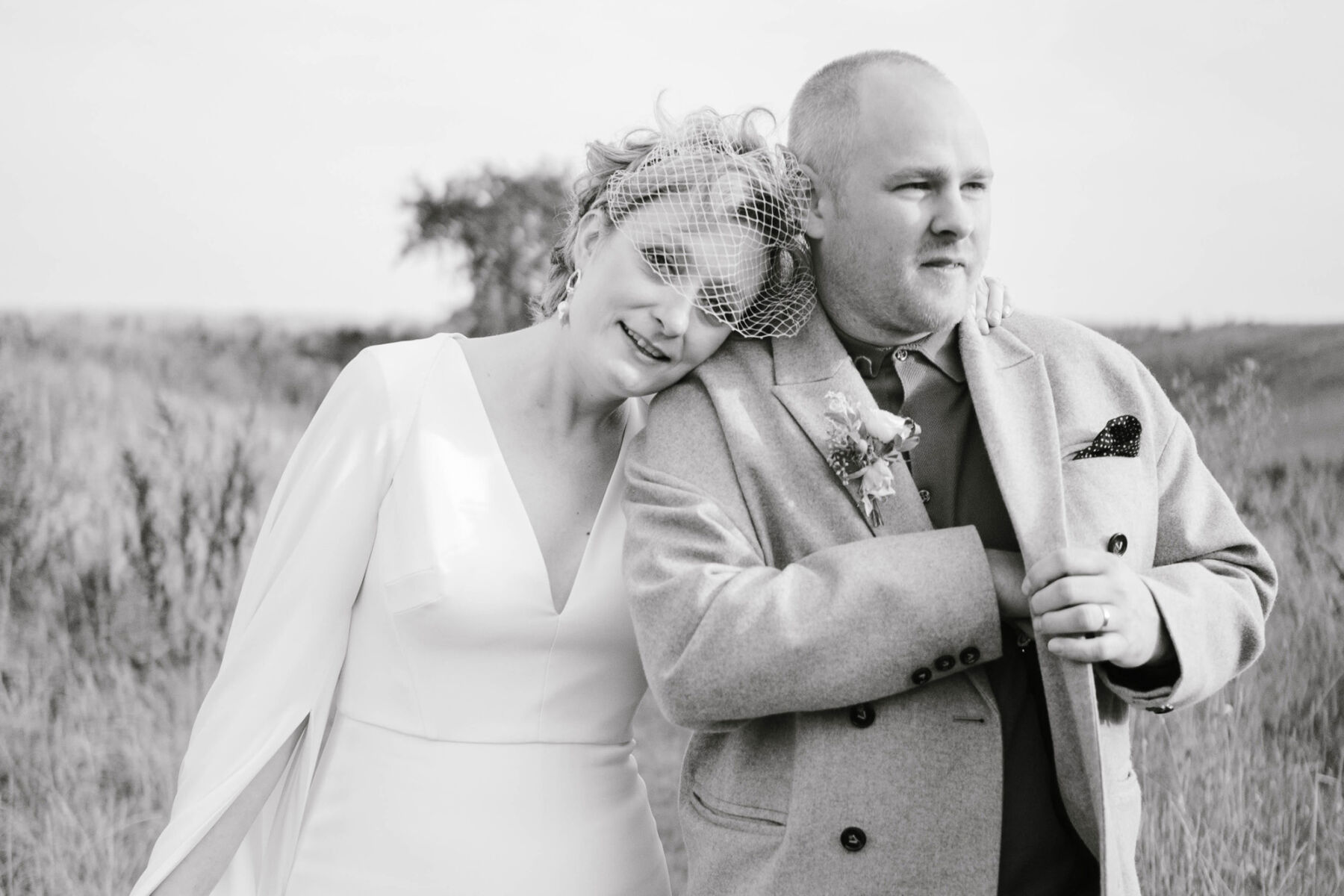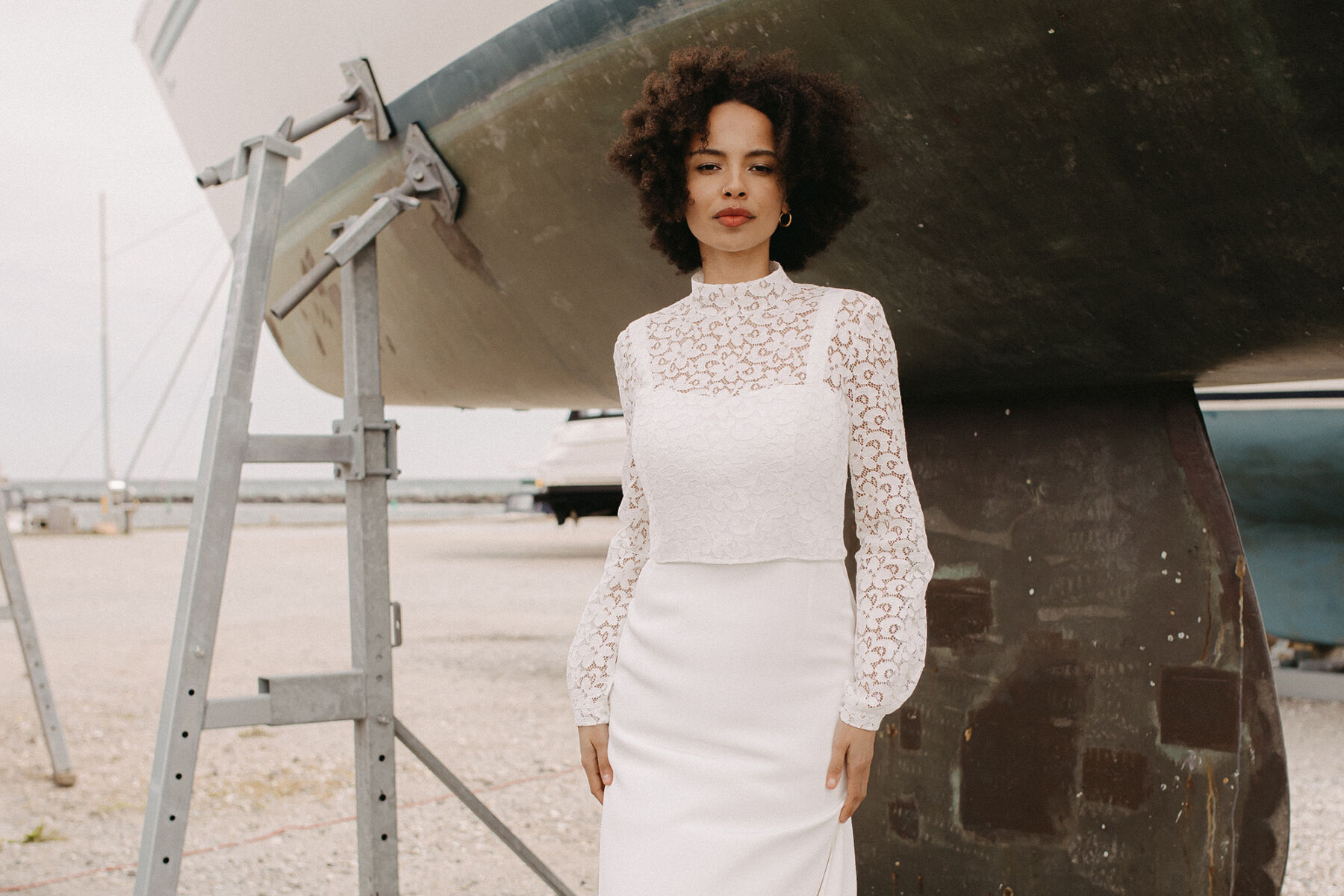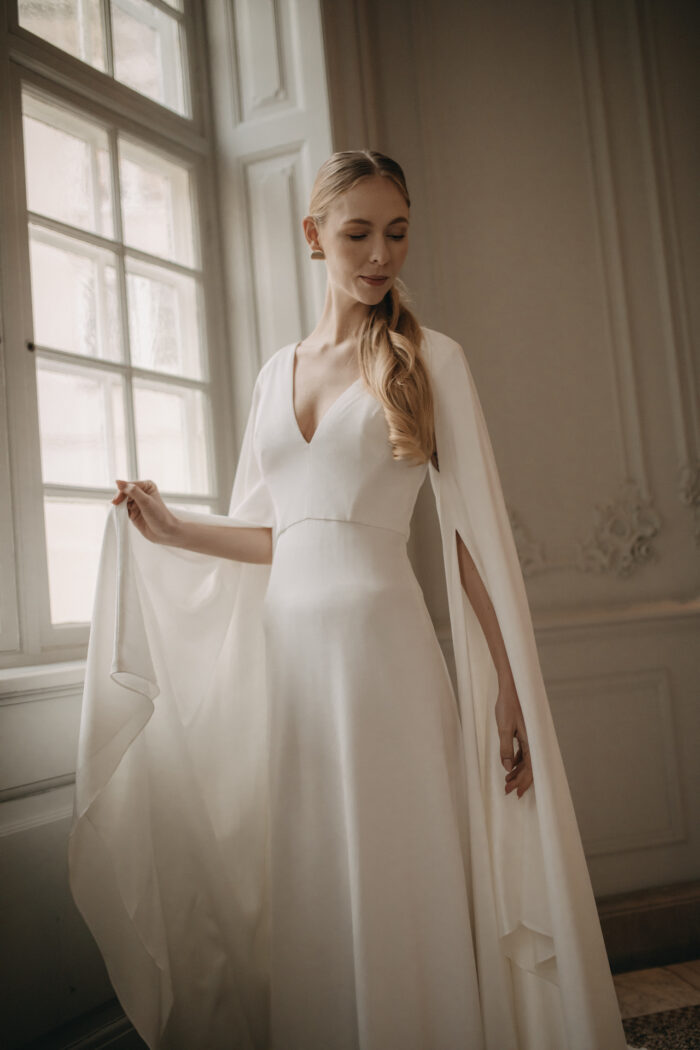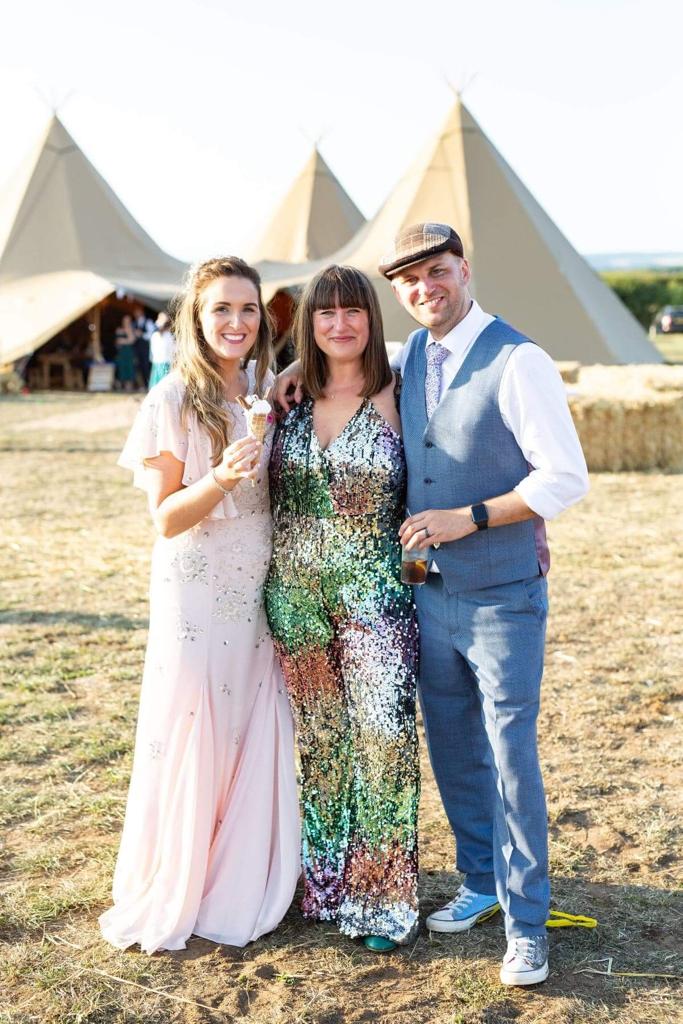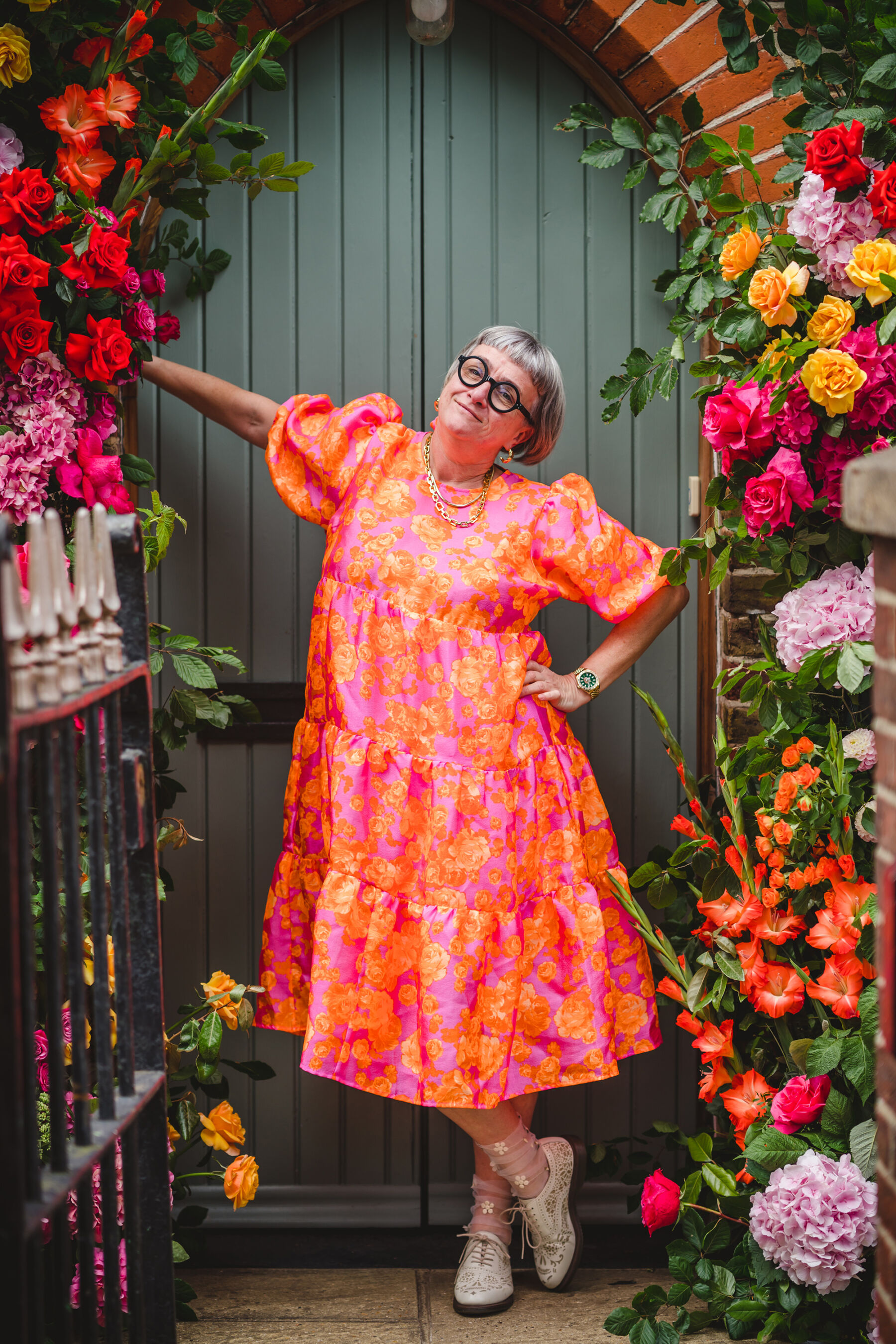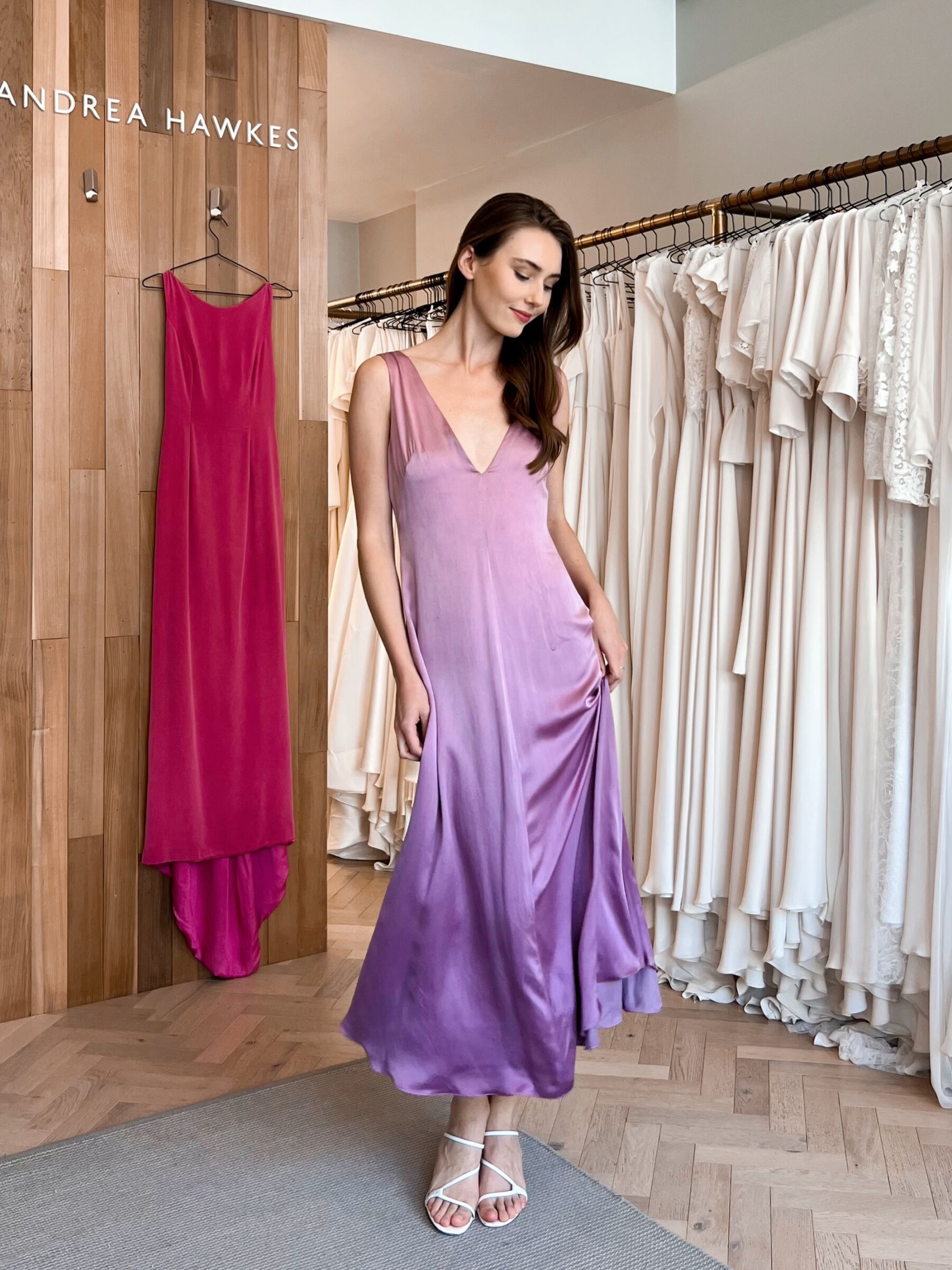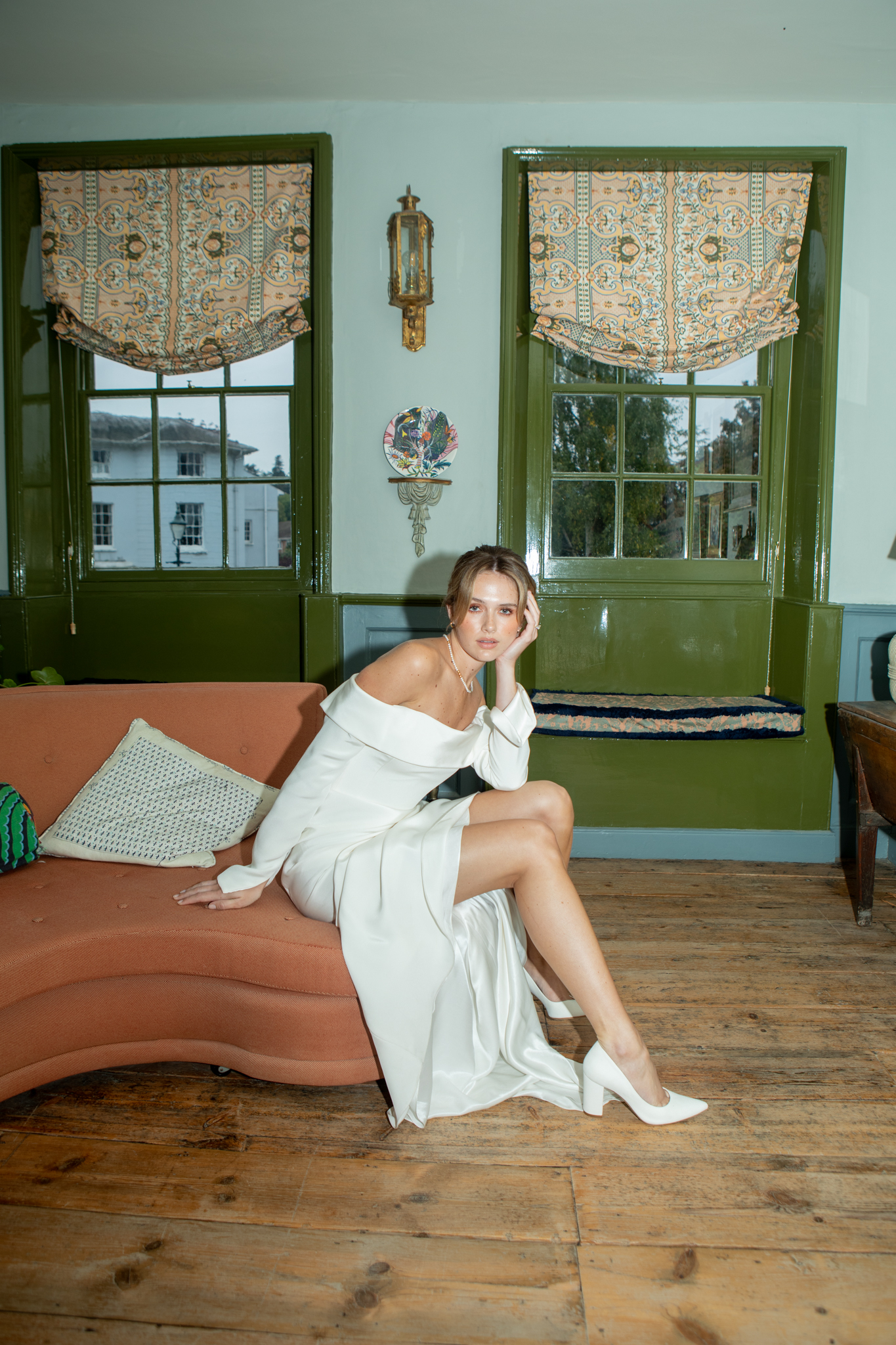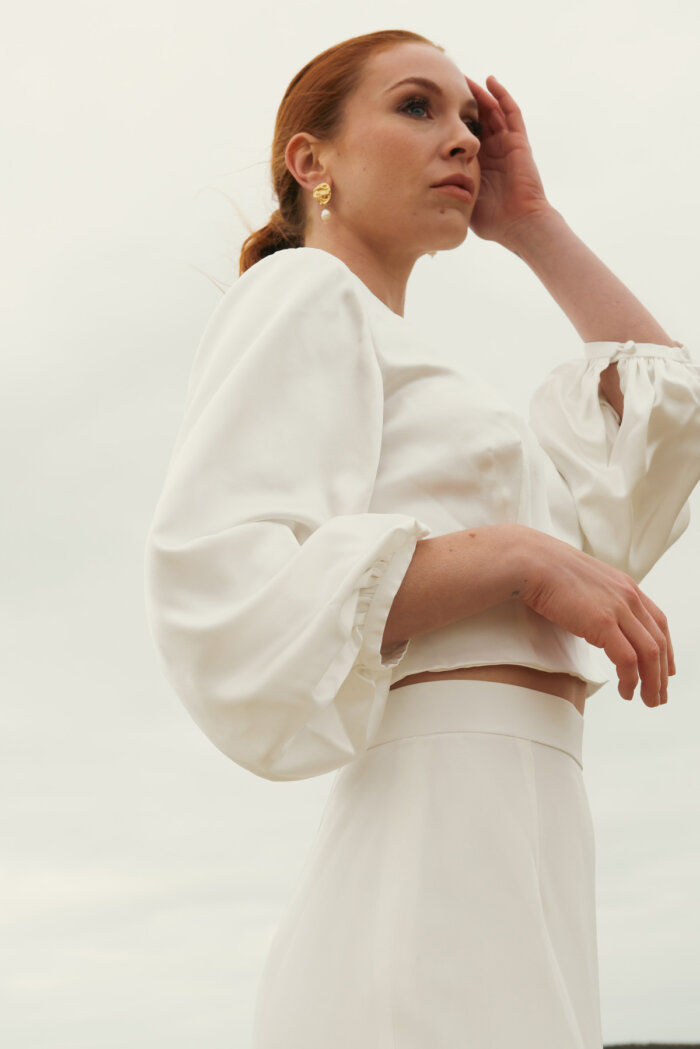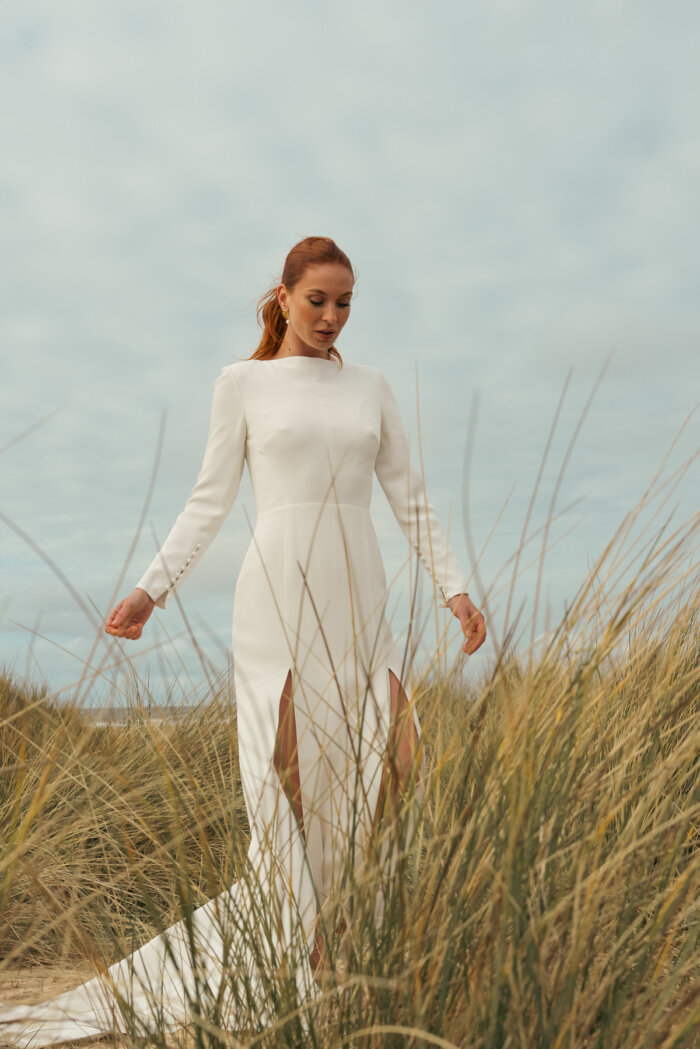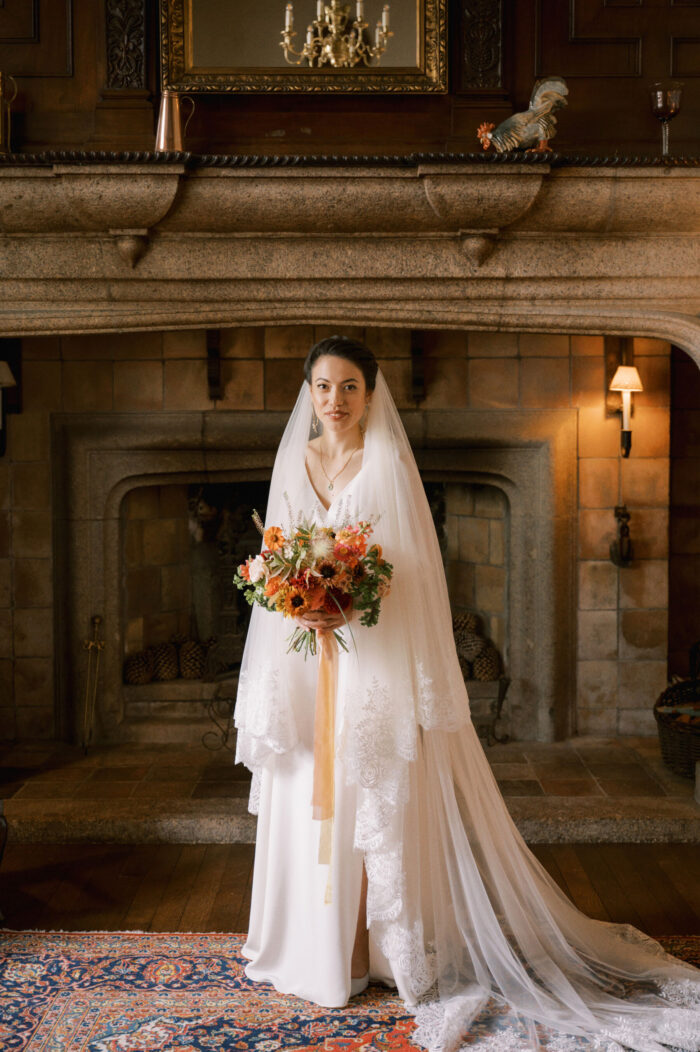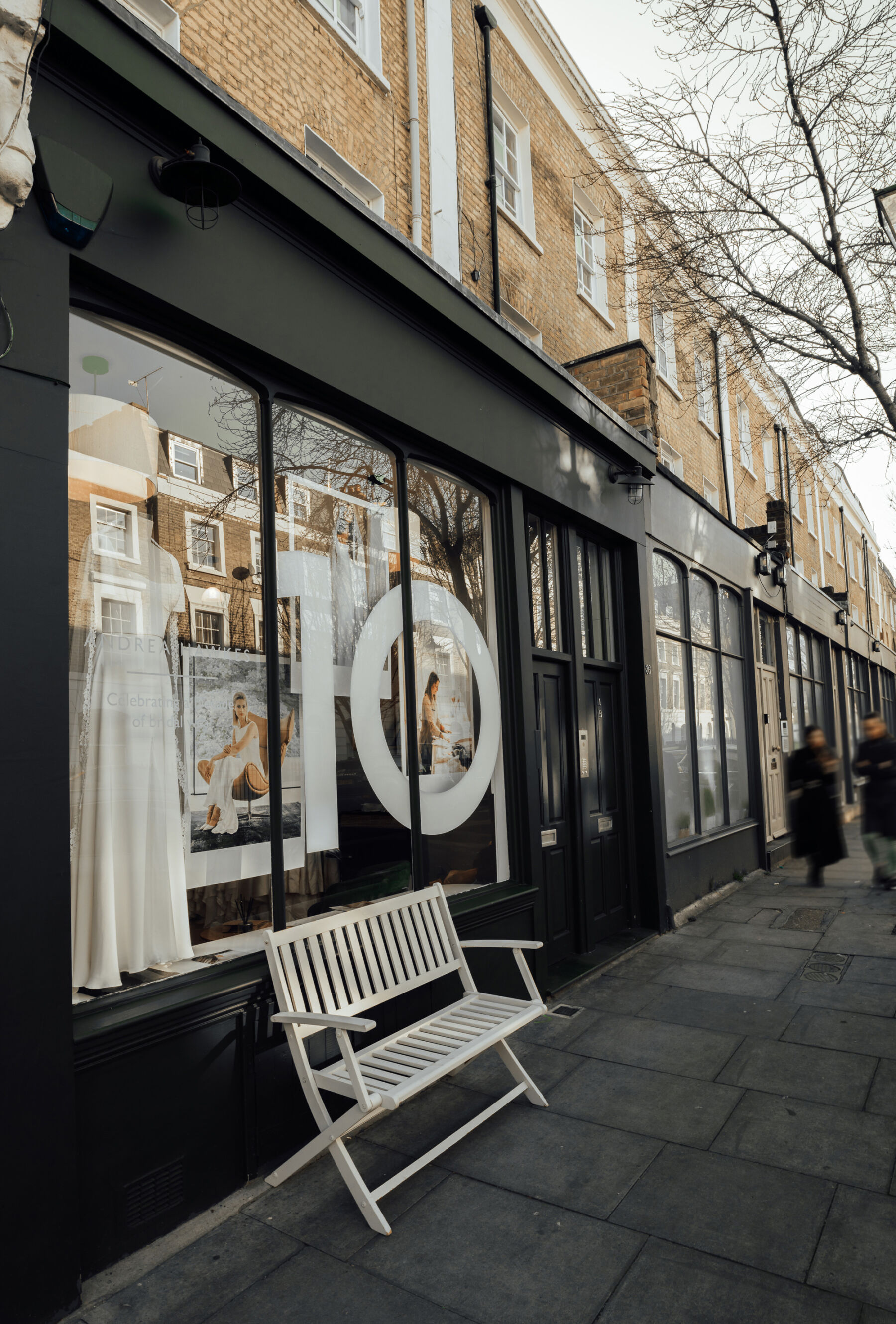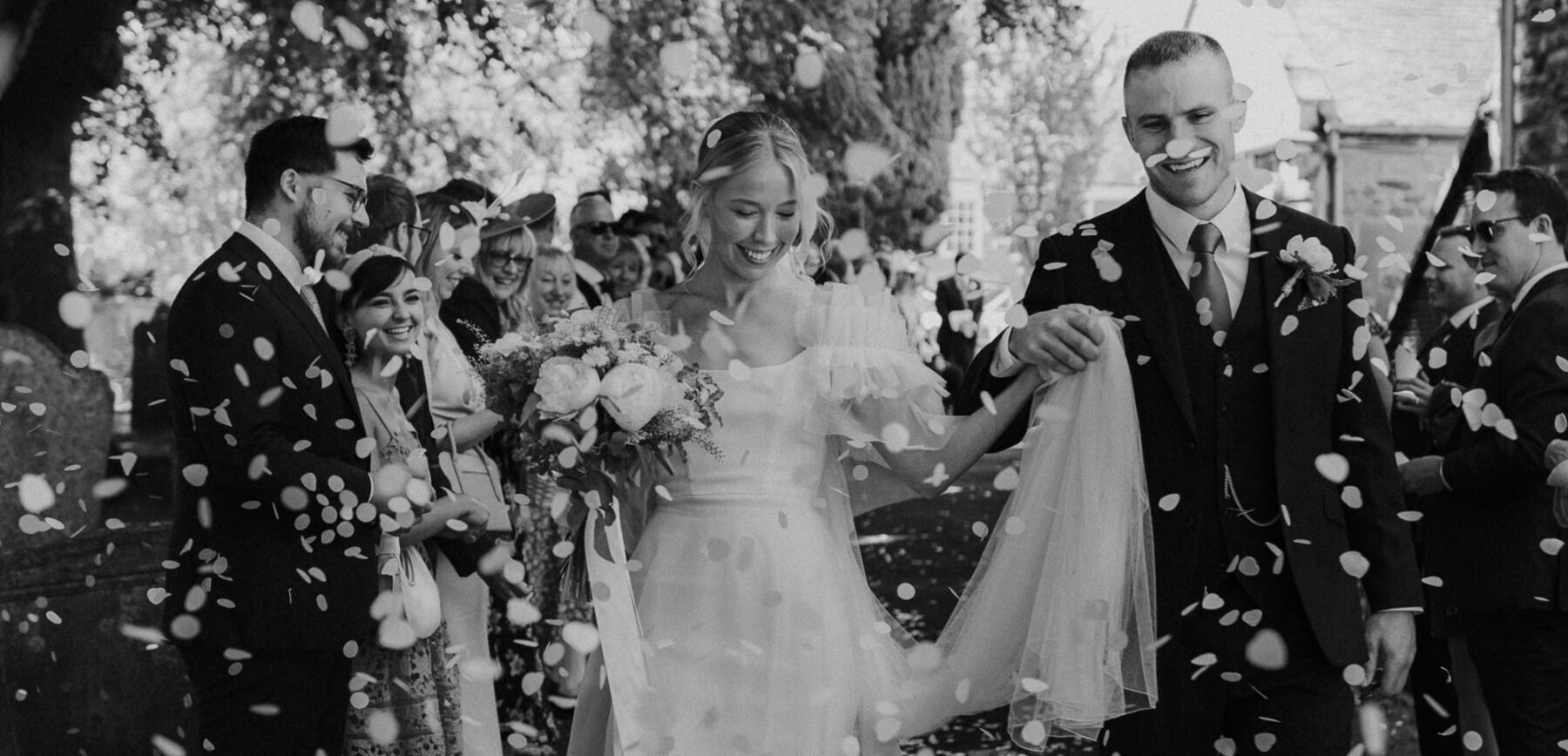My first ever podcast guests are Andrea Hawkes and her husband Dan, who, in addition to their roles as parents and partners in life, are the co-founders of Andrea Hawkes – a British bridal design brand based in London and stocked at some of the best luxury bridal boutiques throughout the UK and Europe.
Andrea Hawkes is renowned for creating sustainable, modern, minimalist and contemporary designs for brides. Using earth friendly and plant based fabrics, her designs are fuss free, incredibly flattering and beautiful to touch and feel against the skin. Every single gown is hand-crafted at the brand’s London studio and this reflects Andrea’s passion for sustaining and nurturing time-honoured, traditional dress making skills. This also provides valuable jobs to a workforce of skilled pattern cutters, seamstresses and stylists.
TRIGGER WARNING: Please note, this episode contains discussions of a sensitive and personal nature relating to women’s health. Listener discretion is advised.
As well as her gowns, Andrea has also created a collection of exquisite wedding veils and luxurious, sustainable pyjamas and nightwear – and, as this episode goes to publication, she will have just launched a natural dyeing service that will enable brides to have their wedding dresses revived and transformed into something really special and re-wearable.
Andrea is a huge inspiration to me – she and Dan are thoroughly lovely, decent human beings and for me, their story exemplifies how to grow and nurture a small business whilst staying true to yourself and your original vision. I admire and respect their unwavering commitment to their core values and their passion for helping brides not only look and feel the absolute best possible version of themselves, but to wholeheartedly embrace the joy of weddings.
Whilst the past three years have brought deeply profound, life altering transformations for Andrea in both personally and professionally – and for reasons that will become clear throughout our chat, this year, Andrea Hawkes celebrates 10 years in the bridal fashion business and I feel both privileged and delighted to be cheering them on from the sidelines as they celebrate this milestone.
A Note on Sound Quality: Please be kind, this is the first Podcast we recorded and there are one or two patches of impaired sound, as my guests were sharing a laptop with no mic’s and somewhat unreliable wifi. This doesn’t detract from the ability to enjoy this episode fully.
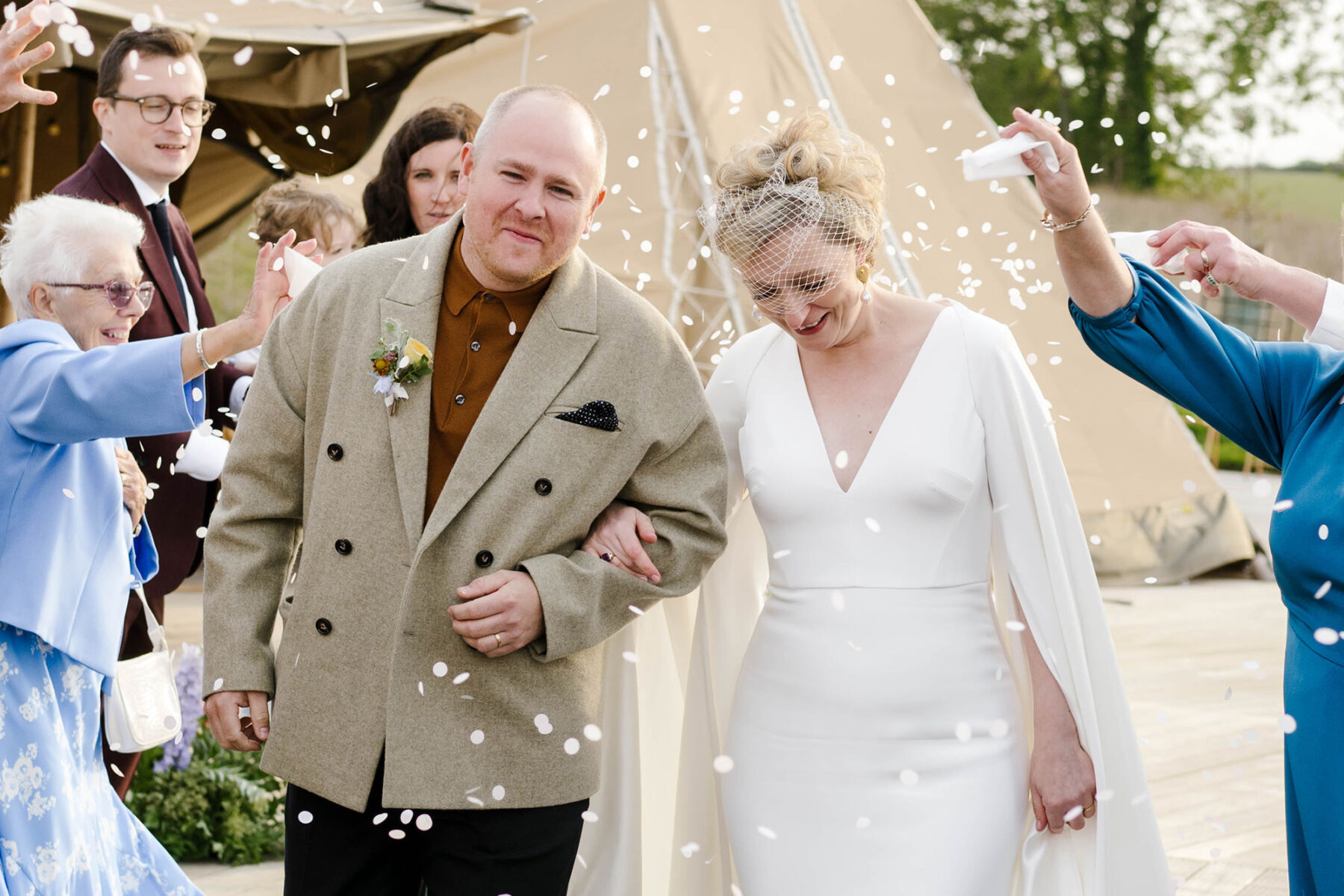
Please Follow, Rate & Review The Love My Dress Wedding Podcast
Countless hours of dedication and passion have been poured into producing this podcast. Created from the heart, The Love My Dress Podcast aims to provide a welcoming sanctuary not only for those deeply involved in the wedding industry but also for couples planning their weddings, individuals with a general interest in entrepreneurship, and anyone seeking a refreshing departure from conventional wedding planning content.
Please kindly take a moment to subscribe to The Love My Dress Podcast via Spotify or Apple and leave a short, friendly review or rating. These small actions will take seconds, but will make a huge difference.
I am so grateful for your support, thank you so much.
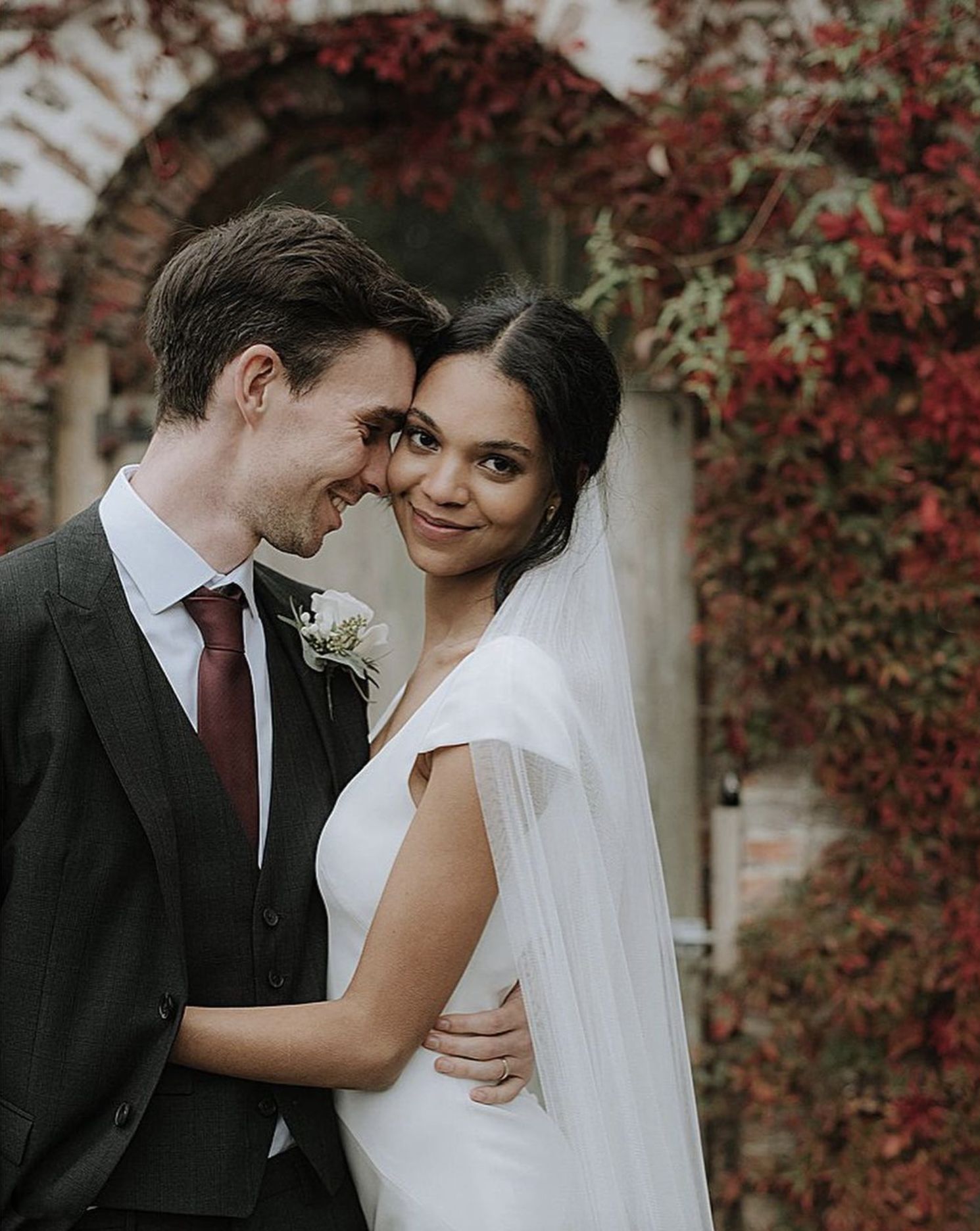
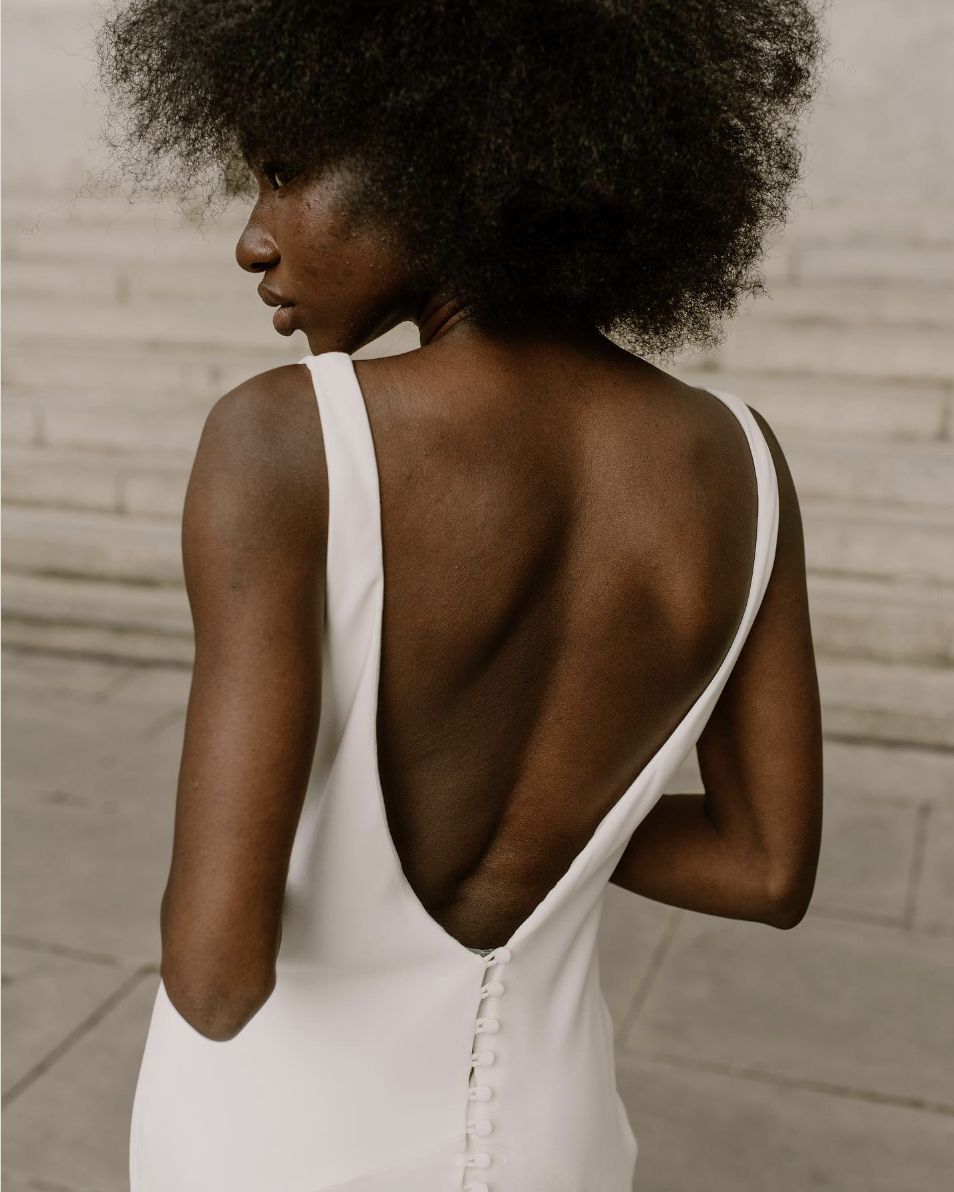
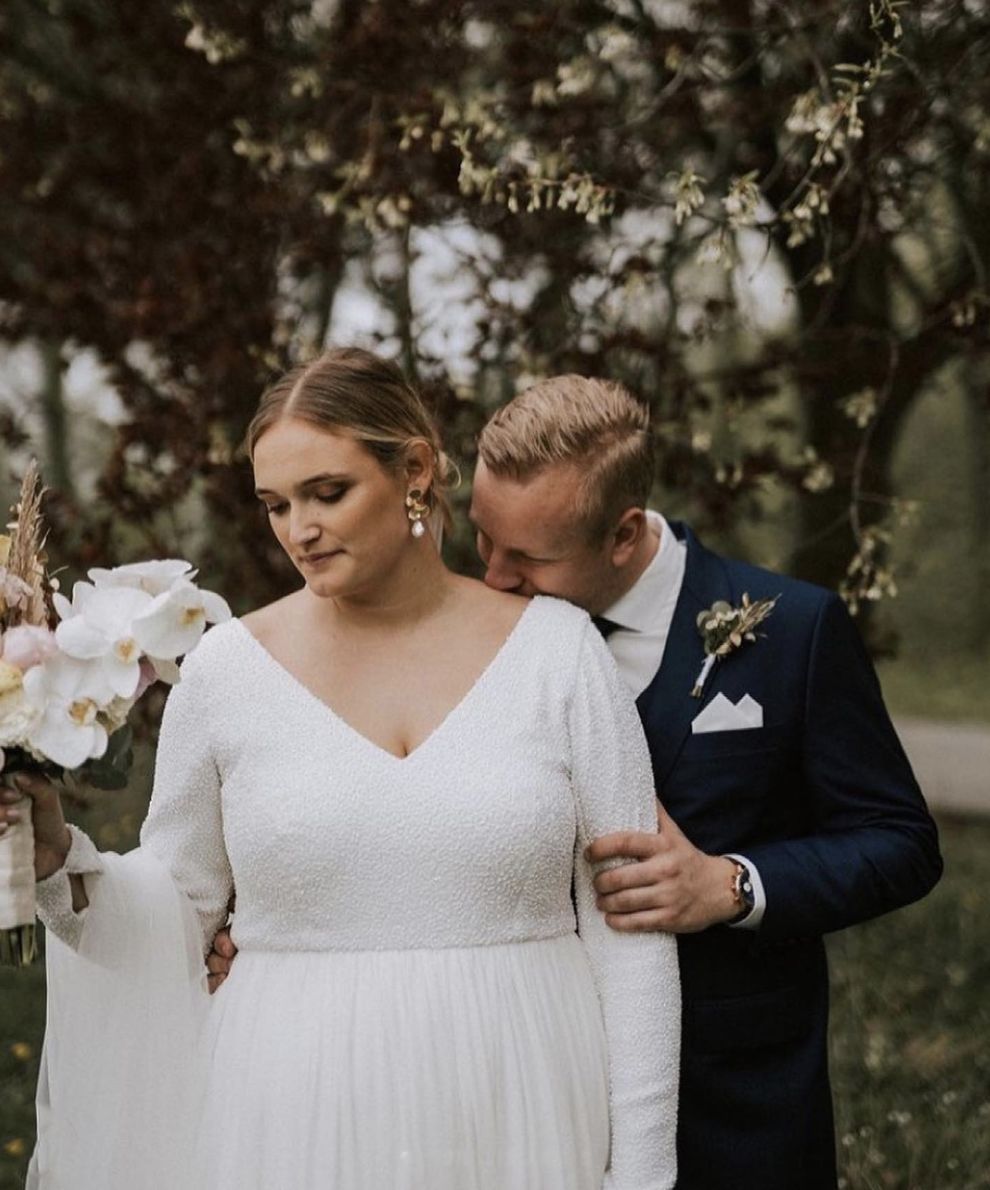
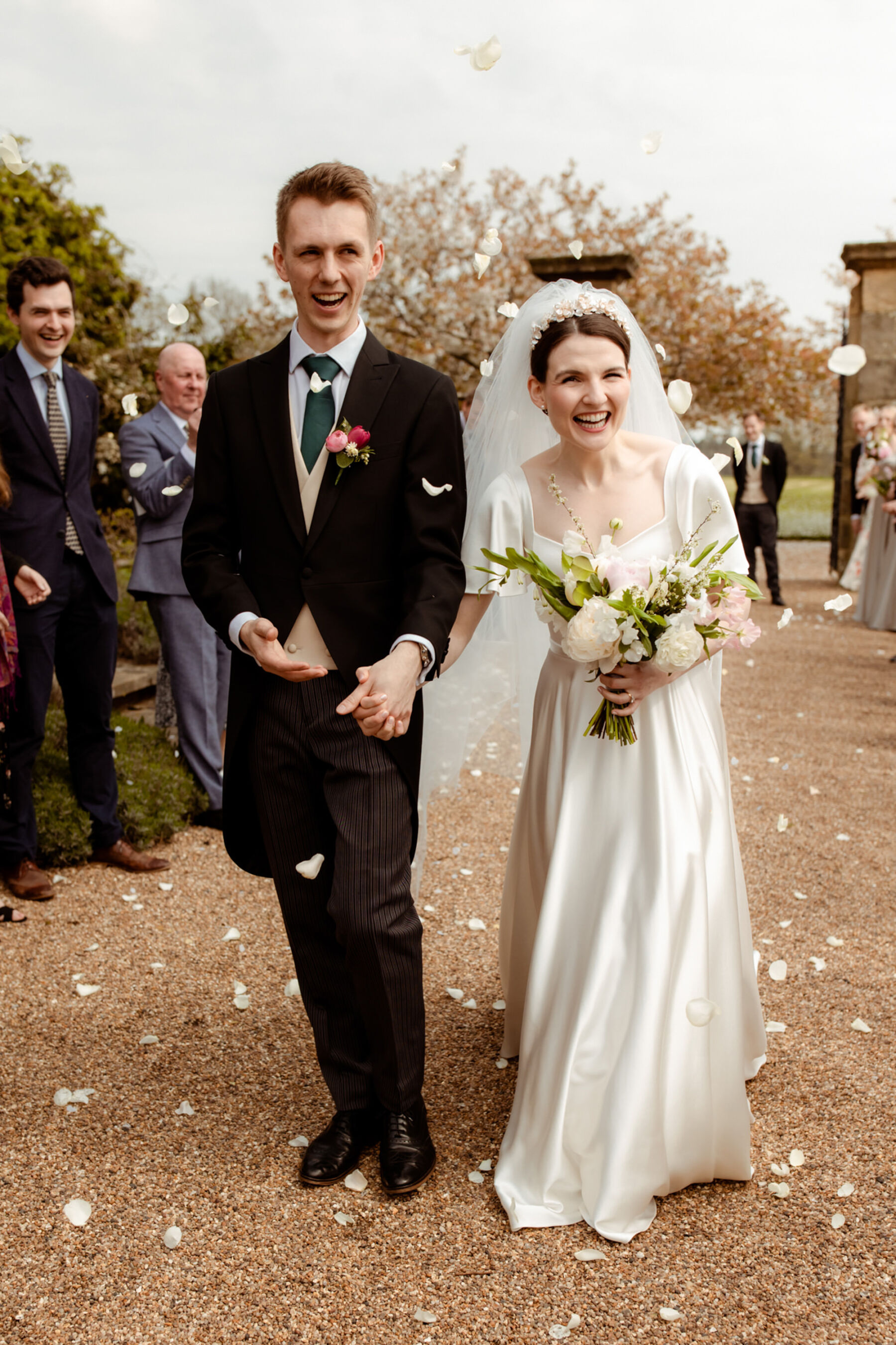
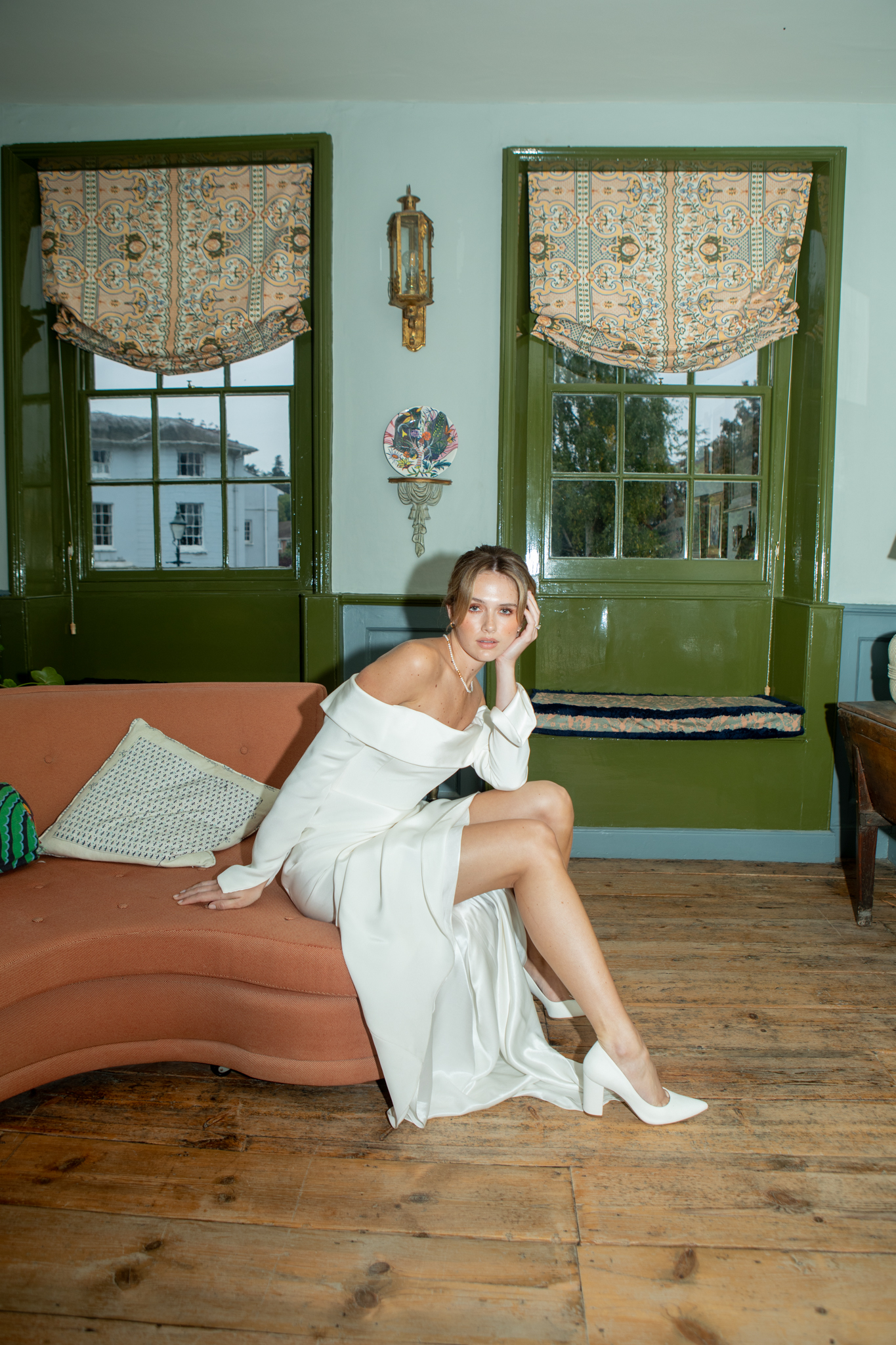
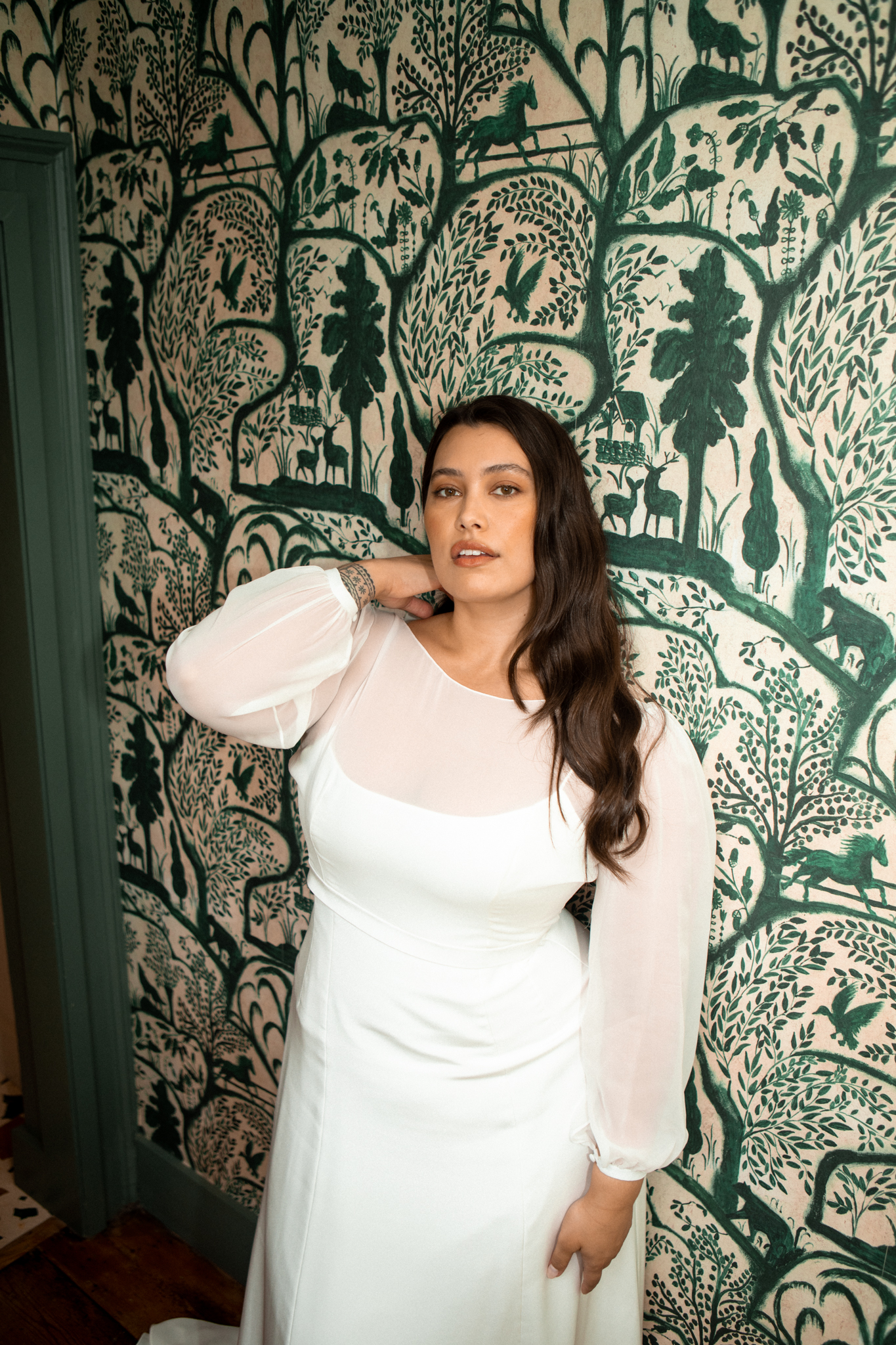
Podcast Transcript
ANNABEL (HOST)
Welcome to the Love My Dress podcast. I’m your host and the founder of Love My Dress, Annabel Beeforth, and I’m absolutely thrilled to have you here. This podcast has been created for anyone planning their wedding, for all wedding business owners and everyone interested in the world of creative business entrepreneurship. Whether you’re deeply involved in the wedding industry. on its periphery or just generally curious. In each episode I’ll be engaging in conversations with inspiring business owners, with creative visionaries and talented entrepreneurs. Together we’ll explore topics ranging from weddings and business, to personal life experiences. Now a quick heads up about the duration of our episodes. I have very intentionally chosen to embrace the luxury of time when chatting with my guests.
And as a result, our episodes typically run around the hour and 45 minute mark. You can learn more about why I’ve taken the very conscious decision to not stick within a strict recording time limit by listening to our trailer episode.
Before you settle in to enjoy this episode, I’d like to ask you to kindly subscribe to the Love My Dress podcast on your preferred platform for listening. Subscribing significantly boosts our podcast visibility and helps us reach a wider audience, which will make this whole endeavour so much more worthwhile.
Please also kindly spread the word about the Love My Dress podcast to everyone you know. And if you find a moment after listening to this episode, I’d be eternally grateful if you could leave a brief positive review. Thank you so much.
But for now, and without further ado, let’s dive right into our episode. My guests this week are Andrea Hawkes and her husband Dan, who in addition to their roles as parents and partners in life, are the co-founders of Andrea Hawkes Bridal, a British bridal design brand based in London and stocked at some of the best luxury bridal boutiques throughout the UK and Europe. Andrea Hawkes is renowned for creating sustainable, modern, minimalist and contemporary designs for brides. Using earth-friendly and plant-based fabrics, her designs are fuss-free, incredibly flattering and beautiful to touch and feel against the skin. Every single gown is handcrafted at the London studio, and this reflects Andrea’s passion for sustaining and nurturing time-honoured, traditional dressmaking skills.
It also provides valuable jobs to a workforce of skilled pattern cutters, seamstresses, and stylists. As well as her gowns, Andrea has also created a collection of gorgeous wedding veils, and luxurious, sustainable pyjamas and nightwear. And, as this episode goes to publication, she will have just launched a natural dyeing service that will enable her brides to have their wedding dresses revived and transformed into something really special and re-wearable. Andrea is a huge inspiration to me personally. She and Dan are thoroughly lovely decent human beings and for me, their story exemplifies how to grow and nurture a small business while staying true to yourself and your original vision.
I admire and respect their unwavering commitment to their core values and their passion for helping brides, not only look and feel the absolute best possible versions of themselves, but for wholeheartedly embracing the joy and celebration of weddings. Whilst the past few years have brought deeply profound and life-altering transformations for Andrea, both personally and professionally, and for reasons that will become clear during our chat. Andrea Hawkes celebrates 10 years in the bridal fashion business this year, and I feel so privileged and delighted to be cheerleading them on from the sidelines as they celebrate this milestone.
Andrea and Dan, I’m thrilled that you’re joining me today, and I want to welcome you both to the Love My Dress podcast. Do you want to just take a moment to introduce yourselves?
ANDREA
My name is Andrea, Andrea Hawkes. I’m the founder of Andrea Hawkes Bridal.
DAN
And I am Dan, and I am the other founder of Andrea Hawkes, and we are very much partners in every way.
ANNABEL (HOST)
So you are actually married, a married couple working together. Briefly, before I go on, how does that work?
ANDREA
Good starting point. Well, we only got married last year. We’ve been together 13 years, so we’ve spent a long time together not married. And I think, to be honest with you, it felt like just a really natural, normal thing to do. Working together, I think we totally trust each other entirely. And I couldn’t imagine working with anybody else, because you just have that massive trust with each other, because you are partners and you’ve got each other’s best interests at heart entirely. Sometimes it’s hard when it’s like the end of the day and you’re just like, let’s not talk about work and it’s like bedtime or whatever. But I think generally speaking, I think we do really well.
DAN
Yeah, I agree. I think it’s for life and family, it’s a good thing.
ANDREA
Yeah, we can sort of balance things out.
DAN
I think we do very separate parts of the business. And I think I’ll say that’s probably the only challenge is not trying to kind of cross over too much at times because we’re both control freaks. But yeah, apart from that, it sort of works well and it’s worked for a long time. And I think it changes all the time, but it changes for the better a lot. I think we’re always, yeah, we’re always reviewing where we’re at and it’s good for the kids and the family, definitely.
ANNABEL (HOST)
I think it’s lovely. I think I’ve always had that very strong sense. And I should explain, I’ve worked with you for some time now. I don’t know how many years. I’ve lost track, but I’ve always got that sense that you’ve been a really lovely, tight-knit family unit. And I don’t just mean you as a relationship. I mean you and your team as well. It always feels like a really lovely, tight-knit family unit. But I’m keen to know, because I wanted to start off a little bit, you know, getting to know you guys a bit more before we dive into the whole bridal fashion and entrepreneurship thing. How did you actually meet?
ANDREA
It’s funny because, you know, last year when we got married, we had to really kind of think about all those things. I think we’ve always sort of put ourselves on the back burner with being so busy. So we met sort of, Dan, can you?
DAN
Well, really the old-fashioned way I guess.
ANDREA
Yeah, yeah, exactly.
DAN
A long time before kind of online dating and…
ANDREA
Yeah, so it’s 13 years ago.
DAN
I think we’re both thankful for that in a way.
ANDREA
Yeah, exactly.
DAN
And we both grew up pretty much, you know, on the same road, certainly in the same area and we’d never crossed paths until we were both in our 20s and it was just a completely sliding doors kind of moment. I was at a train station trying to be somewhere else and it didn’t quite happen.
ANDREA
I was having a drink with a friend who was like questioning relationship stuff and our friends just started talking with each other and then we were kind of like, oh okay, we’ll all just have drinks together.
DAN
And we, yeah, we just ended up spending…
ANDREA
Yeah, we just ended up randomly spending the evening together as two groups of friends. And it was quite funny, because I’m a few years older than Dan, not many, just four.
DAN
Yeah.
ANDREA
Yeah, enough to mention. And I suppose my first instinct was like, who are these younger guys that are like eying up my best friend? And I was just like, oh here we go again, you know, some guys just like trying to hit on my friend and you know, I think I popped the loo and by the time I’d come back they were all surrounding her and I was thinking, well she’s definitely going to, you know, dump her boyfriend now because she’s got all these guys’ attention. And that was it, literally, then we were all chatting, having a great time, having a few drinks, and then, yeah, we just kind of instantly hit it off. And the one thing my friend always reminds me about was that firstly, Dan spilled a whole pint of Guinness down my T-shirt. It was a real great icebreaker. And you know, I was totally fine about it. So that might have been the winning sort of thing for Dan, I was a bit like…
DAN
There’s only one way up from there, isn’t there?
ANDREA
Yeah, or down. And then you sort of started holding hands under the table and I don’t even remember like how I was doing that, like why we were doing that. But there must have been this sort of, I know this sounds really dreamy and airy-fairy, but I just feel like I was at a stage, you know, I was sort of nearly 26 and, you know, both just coming out of other situations and relationships and I was so ready to meet someone and you know, I was having a great summer and I think I just sort of stopped, it just stopped me in my path really and I met someone who I instantly felt was sort of on the same wavelength as me, which actually I found quite difficult up until that stage.
DAN
Yeah, I think we were both at points life was changing, we were both trying to, certainly we were both trying to move to London and do different things.
ANDREA
Yeah.
DAN
And I think when you meet someone on that page, and it’s such… So many interests that are similar, and yeah, just really a hit off. It just felt, you know, they say you know when you know, and I think you do.
ANNABEL (HOST)
I love a good ‘How They Met’ story. It’s the one thing that I like to sort of switch to when I’m reading our real bride questionnaires. We always ask the same question, like, how did you meet? And I love that you grew up so close to one another and had no idea one other existed and have this kind of multiple sliding doors moment where it could have gone this
way or that and, you know, I love that.
DAN
Andrea’s dad was actually one of my teachers, so quite literally.
Andrea and me went to the same school, but we never met until the point we did.
So yeah.
ANDREA
Yeah.
ANNABEL (HOST)
I’m going to come back to the wedding question a bit later on because obviously you know,
you work in the wedding industry and last year you both got married, which was wonderful, we featured your wedding. But I want to ask you first, Andrea, I want to sort of go into this exploration of you as a creative and find out, you know, what drew you into the world of design initially and specifically bridal fashion? Was that always something you wanted to do?
ANDREA
I always pause at this stage because I never overly analysed or have ever really thought about it massively until the last couple of years, because I’ve just been so consumed in it trying to, you know, just enjoying it. I think I have always had a creative spark. I’ve always enjoyed doing creative things. I saw a lot of people in my family do things with their hands so you know woodwork or you know, painting or, you know, extremely good at cooking. And so there was always like tapestry. There was always things going on, even though I didn’t massively have like a creative upbringing. You know, my parents were really kind of sensible sort of jobs, really. But there was always that thing of I saw my mum was really good at art. And initially, I loved cooking. I thought I wanted to be a chef. And that was my initial kind of path from school. And you know I always liked to sew and I think I always had something there but I didn’t really discover it until my early 20s and I think that’s quite common really. And I feel like the way, you know, how the school I went to and my education, it wasn’t necessarily overly focused on encouraging people to do things that are creative and artistic. And I suppose I then, coming out of school, felt like I have to sort of create my own path. And I was inspired by other adults, people that were older than me that were doing creative things and maybe had opportunities that I didn’t have. And I really felt excited by that. So then when that was sort of, when that sparked interest, I sort of knew that I had to take an alternative path to maybe what a lot of people take. And then I just kind of threw myself in it. I think I got the confidence and I thought, you know, I went off and travelled a little bit and I did all the things that maybe other people didn’t do. And I just thought, do you know what, life’s for living and just pull all the exciting creative elements of life. And yeah, I think I gravitated to friends that were creative and then eventually, you know, a partner that was creative too, to a certain degree, and the rest is history.
ANNABEL (HOST)
Yeah, I love that. And I completely relate to that as well, because I know, like, for myself, I was raised in an environment that wasn’t particularly creative. And I think the schooling system I went through didn’t really encourage it. It just felt like something for me that I discovered as well, very much so in my adult life. So I can really understand the path and the journey that you went on and suddenly, you know, suddenly discovering this beautiful thing that sparked you and created passion inside you and sort of revealed a path that you wanted to walk down.
ANDREA
I think I very much had to kind of ignite that in myself and give myself the opportunities to explore and experiment and feel like, you know what, it’s okay to do something that is not the norm.
ANNABEL (HOST)
Yeah, it’s fascinating to me because it aligns very much, as I say, with my own experience, kind of revealing that path and thinking there’s a different way. I don’t have to kind of try and fit into what is expected of me, what’s drilled into you at school. There’s another way. It’s truly fascinating andI think quite a moment when you realise that.
So what I wanted to dig into a bit more was, when did you start to sort of enter the world of bridal fashion? What drew you to weddings to start with and creating wedding dresses?
ANDREA
Well, like I said, I’d initially studied catering and then went off travelling because I realised I didn’t want to do that and was really unclear what path to do. I signed up to a local college that was doing sewing skills, like the basics of sewing, making fabrics. And it was taught by women that had worked in the tailoring trade in London for years and years and years and then they’ve just you know set up this lovely little course in my local college at the time. I don’t think they run it anymore which is really sad but I had learned so much from those women and from the individuals that just had the most amazing skills of pattern cutting and the basics of sewing, how to use a sewing machine, how to thread a needle, how to lay fabric out, what are you looking at different types of fabrics and that basis just made me feel like you know this is amazing and I was really lucky actually because my parents saw that I wanted to maybe do something different and they never pushed me to say, oh you’ve got to earn money and you’ve got to do this. They supported me up until 26. And they just were like, you can stay at home, and you can study. And they really gave me the freedom to make my own choices. And so I went back and did this course in my early 20s after travelling. And then from that, I was like, I’m going to do a degree. I’m going to work at the same time. I had two jobs and one was waitressing at a really lovely restaurant and one was working in a bridal shop in Hertfordshire. And it was a lady that had just set up a bridal business that is still established as a bridal company, but is owned by somebody else. And she stocked British designers, only British made designers, people that worked and produced in this country and they were, you know, doing a really great thing at the time. Pretty much everything was made in a beautiful material and the minute I, you know, I just knocked on the door and said, can I just come and work with you on Saturdays? Like, you don’t even need to pay me, I just want to come and, like, experience this. I think I want to get into the world of bridal. She ended up giving me a job and it was the step into bridal. I loved the whole feel of the tradition of weddings. I loved the luxury materials. I’ve always been a big fan of fabric and the feel and just having something really gorgeous on your skin. I love the craftsmanship of bridal. And I didn’t feel that you necessarily got that from the high street, you definitely don’t get it from the high street, but you don’t always get it from the fashion industry. And there’s something small and beautiful about the bridal industry. And the minute I saw that, and I saw what this lady had created for herself, I thought, I want a bit of that. That’s me. I need to be involved in that. That’s my path. And I’ve got an intuition. I’m really aware of how I feel about things. My environment affects me massively as an individual. So I knew that I had to be and work and spend time in something that truly made me happy on the inside, just made me happy. And I thought, no, that’s not the conventional way of life, but I don’t really want that.
ANNABEL (HOST)
I absolutely love that. There’s so many things that I picked up listening to your story there. The first thing was you talking about how your parents supported you and I just think that’s absolutely beautiful because I’ve got two daughters myself, one 17, and she’s considering her career options now, whether she wants to take a year out. And we had this whole conversation the other day about, you know, it doesn’t matter how long you stay at home, you do what you want. And I want to encourage you to explore and do what you want, you know.
ANDREA
Yeah.
ANNABEL (HOST)
For sure, it’s a privilege, isn’t it, to have that, but incredibly lucky of you to have had that space and that support. The other thing that really stood out to me just then was you talking about your intuition. And I think that’s such an essential lesson to pass on to other entrepreneurs, always listening to your intuition. And I love the fact that right from the very start, you were so tuned into yours and you just knew. You had this vision, you were a visionary, perhaps without realising it at the time, you just knew and followed those callings, which I think is fantastic.
ANDREA
Absolutely, life’s for living and I think I’ve always, that sounds a bit corny and cliche but you know as a teenager, I always felt like, do you know what, I just want to do what I want to do. I always had this slightly rebellious kind of side to me that was like I don’t want to conform. I want to enjoy my life. I want to push the boundaries a little bit and I just had a feeling that I was going to do something. I always wanted to work for myself, so that was key. You know, I was setting up a shop in the garage, trying to sell polly pockets or something. You know, my parents, they said, you can’t turn the garage into a shop, but I would always have a stand outside the house trying to sell something. Inside me, I knew there was something that wanted, wanted something for myself. And I’ve always wanted to stand on my own two feet really.
ANNABEL (HOST)
I think you were destined to be an entrepreneur essentially, weren’t you? And it’s again, I recall setting up my own little museum in the front, I think it was in the dining room when I was young and always wanted to do something and earn a couple of coins off my grandparents. People who have that entrepreneurial spirit, they maybe don’t realise it when they are so young but I think it’s there, it’s always there. It’s fascinating to hear that story from you.
ANDREA
Yeah, I mean, and there’s two different sides to it, isn’t it? Because it’s sort of being creative and feeling like you want to do something creative, and then there’s being entrepreneurial. And I think Dan and I had a discussion about this. It’s like, I don’t think we’ve overly ever seen ourselves as entrepreneurs. It feels like a bit of a funny word to me. I think we just sort of, we’re just hardworking. We just get on with it. And we just enjoy, we enjoy everything we do. And that may seem like we’re being entrepreneurial. I suppose we are to a degree, and Dan is probably more that way inclined.
DAN
I think it actually, it’s like you, if you can manifest an idea and turn it into a career or a path, I think that sums up that word, doesn’t it?
ANNABEL (HOST)
Yeah, I agree completely. It’s about taking your creativity and being able to create a
career out of it, I guess, and do something you love.
DAN
Yeah, sure. When you’re kind of, us and the way we do it, I guess we look at people that run multiple businesses and they’re in different sectors. You see that as someone who’s an entrepreneur, but it’s each to their own, isn’t it? And I just think, consider ourselves like creative business owners, you know, that’s kind of…
ANDREA
We’re so practical.
ANNABEL (HOST)
I will take a note.
So Andrea, tell me, when you were working with this other lady, how long ago was this when you realised, when you had that lightbulb moment that you wanted to set up your own business in bridal? Because you’ve been in business for 10 years now, you’re celebrating your 10th anniversary. Was it quite a gap between that lightbulb moment and you actually starting out?
How did you get from there to actually being the owner of your own business?
DAN
I would say it was there when I met you. So it’s, yeah, probably without,
even maybe without realising it.
ANDREA
I think there’s a lot that is, you don’t always realise, do you, that’s kind of there and building up. I think pretty quickly because I, like I said, I always had the feeling that I wanted to work for myself. I wanted to work having my own thing. I wanted to create my own business, so to speak. So I think the minute I felt that that was the path and that I enjoyed it, there was something that switched in my head that made me say, do you know what, then, how would you make that for yourself? How would that work? And I was always, throughout my whole career of working with other people, other designers, and then before I worked for myself, so to speak, I would always think, well, I would do it this way. I would do it that way. Well, why would we not do it this way? And I think Dan can relate to that because he’s, you know.
DAN
Yeah, I think I’ve never really worked for anybody else. But I think us meeting kind of, yeah, maybe it creates more of a catalyst of kind of, we want to do our own thing, whether that’s together or whether that’s me supporting Andrea to do that or vice versa or whatever. I think we were both destined to kind of do that. It comes from my family, definitely.
ANDREA
Yeah.
DAN
But yeah.
ANDREA
Dan’s family is very self-employed. You work for yourself, you have your own business, you kind of create your own path and I think I got so much positive strength and energy from his side of the family who have always been like, you want to do something, do it.
DAN
Yeah, yeah. It was kind of like Andrea would be like, I want to start my own business and me and my family would be like, well, you wouldn’t do anything else would you?
ANDREA
So from a practical perspective, did you have to take out loans? Like how did you take that leap to the point where you’re actually owning your own business and making it happen?
DAN
We’ve always kind of swapped over. One of us would be studying, one of us would be working. And certainly when we moved to London, obviously, all of a sudden you’re thrown into this world of trying to exist yourself. We’ve always stood on our own two feet. And I think we’ve always then balanced that with what’s one doing, what’s the other one need to do kind of thing. And I think when we got to a point it was like clear, Andrea needs to go off and start a business. I think I was working at the time doing my own things and I think we put a bit of our own money in at the start. We had a small startup loan which I think was more to do with a bit of guidance, as much as the monetary aspect.
ANDREA
I had a friend who had set up a business doing something completely different but was really inspiring at the time and I was kind of working doing other things and I was talking about what I was going to do next and she said, have you ever thought about doing like a start-up loan just to kind of give you five minutes to get on your feet and it kind of gives you guidance, it gives you a mentor, but also then you have this loan on the side. So I suppose it might be a bit like the Prince’s Trust, but it wasn’t that. And I just inquired, and yeah, it went from there, really. So we had some mentoring.
DAN
It gave us a small amount of money just for basics. I think we spent it on a website, things like this.
ANDREA
And it was the fabrics.
DAN
Just to kind of cover the initial collection and things like that. But it wasn’t a huge amount. And I think that’s kind of needed. But I think you’ve got to accept that it’s not going to last very long. You’ve got to start a business with the, you know, you’ve got to start finding clients from day one. That’s it.
DAN
But the payback was, you know, the borrowing rates were really low and it was a really good option. And also I had someone who I met up with, I can’t remember now, but it would have been maybe every couple of weeks. And she was sort of like helping guide to a degree how we do things because she was, it was a fashion setup. Right.
ANNABEL (HOST)
Right, so you were working from, I guess, your shared home at the time. You didn’t have your own studio or boutique or anything. It was a kitchen table sort of setup.
ANDREA
Yeah, it literally started from the kitchen table. Yeah, it was, we had a one bedroom flat, which we had when we were both working. And the minute I suppose we had that, I was a bit like, right, okay, let’s just mix it all up again and decide to leave my job there, try and make staying in Highbury absolutely possible. So yeah, one bedroom flat in Highbury. It was really tiny. I mean we could see our bedroom, we could see the cooker, you know, it was all open plan, but it was, it was great where we were based. And I literally started on our kitchen wall with somebody who I’d known previously who could help me with the patterns and advice on making etc. So I suppose I employed her to help me do the initial patterns of which have been the starting point of our collection, you know, of our collections and we still use those base patterns today, which is amazing. And everything just went up on the kitchen wall.
ANNABEL (HOST)
Fantastic. So how did you get your first clients? Did you create a collection? Did you have to go and do the hard slog where you’re like physically visiting the boutiques, you’re introducing yourself?
ANDREA
No, I think, how do we do it? So…
DAN
Definitely some clients came organically through a bit of word of mouth, I think.
ANDREA
It was word of mouth initially. It was a little bit of like, you know…
DAN
And it was one or two, really, to start with.
ANDREA
Yeah, really small. Me doing most things, so from the selling. And I remember even, like, our first client came to our flat. And at the time, I was thinking, this is so unprofessional. But you know what? This is just how it’s going to be. My sewing machine is at the bottom of our bed. And you know what? Thank goodness for those that really saw something in me and was able to help elevate what we do. I actually made a dress for a journalist news presenter who lived in East London and I think you know it was like a recommendation from a creative industry contact that I had and you know those little things just gave us a little bit more money to be able to take on a studio space.
DAN
We did a small studio space.
ANDREA
In Hackney central.
DAN
Which was basically… Yeah, it was kind of a spare room that an architect had right in Hackney Central and it was such a great space to have and so reasonable at the time. And between that and doing, we did a pop-up in Stoke Newington and I think that was the changing point because it, suddenly we had a shop window and then it was getting that feel for people just walking in off the street and they knew somebody getting married, or they were getting married and I think Stoke Newington was a great space for that because there’s no tube there, people walk around there, people love the high street there and there’s a lot of residential in and around the space. I think we just met a lot of people in that short time.
ANDREA
I think there’s a few things here to sort of make, set the tone in the picture. Firstly, we lived in Highbury, we lived in Islington, Hackney area. We spent a lot of time socially at the time, a lot of our friends lived around there. We knew the area pretty well, but traditionally, bridal places aren’t in that area of London. And the studio we took on from someone we found that needed to rent out this spare room in his architect’s practice, so that was really easy and simple, no commitment, no massive commitment at the time, and I could cycle there every day. And it was just me taking on friends and people I knew in the industry, doing an odd day here, an odd day there. So that allowed us some flexibility to be able to, you know, set up to a certain level. We did the little room up so nicely that it was almost too nice. And I think, you know, the room was fabulous, but the entrance was a bit grimy. So I think quite quickly we thought, do you know what, we need to look for a shop. So Dan being Dan, who is very kind of forward thinking, and, you know, I think we just asked if the shop was available to rent for like six weeks or something. I think we just walked in a shop on Stoke Newton High Street. Is it the High Street?
DAN
Yeah. They were between…
ANDREA
They were between tenants. And we just said, literally, can we just take it on for a few weeks? And we were so lucky that they were just like, yeah, okay. So we ended up in there for about three months, I think. And we got it to a level that looked pretty good. Managed to get a couple of other companies involved that would put their bits in there as well. And I think they took a little bit of the cost of that. And I asked one of them to be able to man it, a day or two a week. So we kind of learned that, okay, one, it’s different having a shop window to a studio, because the minute you’ve got a shop window, you’ve got to be open sort of nine till five. Studios close the door and just see people when you need to. So it was like, do we want this? Is this the way our business should go? So it was a really good experiment for us that didn’t cost us a lot of money. I could walk there. We didn’t spend any money on anything else. We just simplified the rest of our life other than eating and paying our mortgage.
ANNABEL (HOST)
Again, it sounds like the universe is aligning something for you and making that opportunity happen. It kind of fell into your lap at just the right place to help kind of level up and evolve your business just when you wanted and needed to.
So right now the way I would describe your brand is it’s very well regarded for that kind of contemporary minimalist style but also you’re very, very committed to sustainability and always have been from the very off as far as I’m aware. Can you talk more to me about that? Was that a big thing in your life? Has it become bigger? Like, was that something that drove you from the very start?
ANDREA
Yeah, I think, again, the things that I’ve always been attracted to have been beautiful fabrics. I’m really a big lover of material. And I suppose the most beautiful fabrics are ones that are the best quality. So that enticed me initially. Yeah, I think on a sustainability level, yes, we have always been. I think I’ve always wanted to live the most sustainably as possible, I suppose. The way I know the industry, people producing in this country, producing in beautiful fabrics, employing their own team, has always inspired me and I don’t know any other way to be really, but that is the way that I love. I want to do it that way and that’s what I’ve always been interested in. So now it’s becoming more an issue with sustainability, but yes, it has always been something that we’ve been focused on.
DAN
You know, I think initially it’s… if you remove the word, we were almost doing the things we were doing because they gave you the best result and the best quality that we could offer. And it was Andrea’s experience of working elsewhere and understanding that there was never really a conversation with the making side of it to outsource or to, you know, it was always, who do we know? How do we employ people? How do we build this as a studio? How do we create it as somewhere that someone comes to and something is made for them and they know that from the offset. I think that was always kind of done without much thought. And then I think the fabric aspect of it has been important to both of us. Like I say, initially that the quality was at its utmost.
ANDREA
Yes, that’s the best way of putting it.
ANDREA
And then I think as the word sustainability has all come into our lives more and more. We’re realising that we were doing a lot of things what I would regard as right. And I think now we understand that we’re at a good starting block. Certainly, if we rewind probably two or three years ago, we were at a good starting block to say, where do we improve from here? And I think that’s still now happening. And I think that will be happening for a long time.
ANDREA
Yeah, I think Dan said it perfectly, really, in the sense of, it wasn’t that we weren’t focused on being sustainable, it’s just something that we’ve always done and that is that’s that’s genuinely the way that we have always operated. But it has initially started off the back of the love of quality, the love of craftsmanship, being British made, you know, wanting to support that trade here. All those elements have been the starting point of it. And then now, sustainability, word, and you know, the whole subject is, is, is more known about. Yes, it lends back to what we’ve started.
ANNABEL (HOST)
I think it highlights what you naturally do, doesn’t it? You know, it’s fascinating for me, because I’ve also worked in the industry a similar time to you, probably a little bit longer. And I think what I’ve seen is not just in bridal fashion, you know, just across the board. It feels like for some brands, it sounds awful to say it, but there hasn’t been a genuine kind of authentic, we need to really look at our practices and what we’re doing here to try and be as eco-friendly as possible. It’s felt more like a trend almost, you know, and like something that they just have to do, whereas it’s never been like that with you guys.
ANDREA
It’s not necessarily something that they have to do.
DAN
I guess there’s not like a, there’s not a law or a legal aspect of having to do it.
ANDREA
No, they don’t have to do it yet.
DAN
Unless, let’s use the word, yeah, because let’s face it, that’s going to come and I think that’s right that it comes at some point. I think, and we talked about recently is, there’s something I read that was a big shift in, I think one of your, probably one of your questions, Annabel, would be like, is it important to clients? And actually, I think the importance is starting to be on the designer and on the brand. I think that’s right. You kind of stop the conversation because if suddenly everyone is doing that, it’s then the client doesn’t have to think about it. And surely that’s the only way it can improve. Because you can see a demand from clients, but let’s face it, they’ve got a lot of options. If it’s not their focus, they’ve got other options. If it is their focus, then there is other options. So it’s, yeah.
ANDREA
I think the difficulty is that, you know, everyone’s kind of, maybe they are genuinely conscious of being more sustainable. The thing is, is if you haven’t started making or producing in materials that are sustainable, how do you transition and start being more sustainable? You then have to say, we are working on our sustainability practices by changing our stationery, our bags, what we’re making here.
DAN
Yeah, it’s not at the heart, of maybe actually what needs to be changed.
ANDREA
There’s lots of things that you can start to focus on. I mean, I do it when I look at things, when I’m buying anything now, I look at what they say and I look at the language that is spoken. And if someone is, if a company is translucent, you’ve got me. I’m loyal, I’m there, I’m going to buy from you. If you’re giving me some wishy washy words about sustainability, I’m not interested. And as far as I’m concerned, people are getting more savvy. We’ve always had questions. I reckon in the last sort of seven years or so, we’ve started to have the questions of, are your dresses made in a natural fibre? Well, yes, that’s been evident from day one, we do use natural fibres. What does that mean? But some people really are very, very, very aware of what that means. I think we can give someone all those answers because we’ve spent a lot of time, one, genuinely caring about sustainability and being able to give that as an option to our brides.
ANNABEL (HOST)
I think that’s fantastic, and I think a lot of it is about educating and I think that’s been quite a slow process up to now, hasn’t it? Because ultimately these more sustainable fabrics are going to be more expensive than the cheaper to produce, more polluting ones. And I think that’s been something that the public has had to grapple with, isn’t it? You know, I’m going to have to pay more to, you know, feel like I’m doing my part to help protect the environment.
ANDREA
You know, we all grew up in a consumer time and you know I grew up where like you bought for the weekend you know more disposable and, and that’s the way we, we grew up you know and in a time of growth and you know the way people were producing it, it wasn’t really known about.
DAN
Well that’s the big thing.
ANDREA
It’s changing now.
DAN
It’s calling yourself sustainable or saying that you’re working towards that.
ANDREA
Yeah.
DAN
And I think we’re all working towards that.
ANDREA
We’re all working towards it. You know, we can’t say….
DAN
You can’t overnight change a very long, you know.
ANDREA
No.
DAN
A long history of the way that people consume and spend.
ANNABEL (HOST)
I see the term responsible popping up quite a lot. I think that aligns with where people are finding themselves at. They don’t feel too comfortable calling their business fully sustainable because they’ve got things to do, they’ve got actions to take, but if they’re responsible and they’re trying their best.
ANDREA
It’s really mixed. And I think, you know, honesty is the best policy. And that’s what I’ve always based our business on. You know, I’m very straight and very honest. All I can comment on is how we operate. But I think if you’re honest with people about the things that you need to improve, that’s probably a good start. But I suppose you’re not going to be that way if you’re making in something that’s fundamentally virgin polyester. You just can’t, can you?
But I think our changing point is, you know, not just necessarily making something in silk material, because that doesn’t always please everyone and you know, the thing that we’ve had to really start focusing on is looking at plant-based materials, because we feel that’s something that moves us forward and makes us more unique. So Dan is absolutely the best person to talk to about that side of things and…
ANNABEL (HOST)
Tell me about your plant-based materials, please Dan.
ANDREA
We’ve done a lot of research over the years.
DAN
Well, it is not… The thing is, it’s not anything new, is it? The likes of a Tencel Lux is something that we’re really progressing with. I think it’s, again, even for us, we can’t just change overnight. It’s been a lot of experimenting and sampling, and we’re still very much not near the answer. We are pleased to have introduced certain things, certainly for the collection just about to come, and certain products we found that Tencel works for really well and others it doesn’t. And so that’s an exciting part of what we’re doing. I enjoy that. I think the team enjoy that, when we’re sort of trying to progress and trial things and you know what, a lot of the time it won’t work, but we will find an answer for certain things. And it is a part that we’re building into the business and the way we move forward. And actually, I think it’s enjoyable. It’s a challenge, and it’s something fresh, and it’s something that I’m proud we can talk about. And yeah, it’s good.
ANNABEL (HOST)
I think that’s really fantastic, and that there’s recycled materials out there. And, you know, fabric’s being created from recycled plastics and, like, orange peel and, you know, all kinds now. So there’s definitely different options out there that are more friendly to the earth and I think it’s a good point to be at where you’re sort of looking across that landscape and working out how to incorporate those materials, you know, so that it can be enjoyed by your brides, because my goodness there’s such a difference wearing, feeling, the fabric quality, you know, against your skin, compared to polyester, it’s just something else, isn’t it? It’s a different experience altogether.
One thing I’m quite curious about, because I’ve seen it pop up over the past few months, is the whole concept of a rental market. The idea of renting your wedding dress, basically.
Is that something you’ve ever considered or would move into?
DAN
I think we’ve both got different sides to look at it from. I think Andrea sees it from a very much client side, and I see it from maybe the business and the production side. So I think on… It’s something we’re not doing at the moment. It’s funny because it’s kind of a new topic I think for the UK but actually quite an old topic for other countries because it’s something that they’ve done for a long time. We’ve definitely seen this with the Japanese market for instance. I think from my side and the production side, I think it’s like a thing to learn in regards to how we run the business and the fact we employ a team and the way that we produce. I think it could have a big impact on that, and I think that’s important for us to consider firstly. We also make everything to order. So it’s that impact for us isn’t quite right, where maybe if you’re more of a manufacturing company, you’ve got the level of samples that, actually this is a bit of a quick answer for you, maybe, I don’t know, but for us it’s got to be quite a big consideration. It’s also got a lot of logistical, I don’t want to use the word issues, but I think they are issues because we’ve seen over the period of 10 years, brides leave with their dresses, a lot of the time they come back because we offer aftercare services such as cleaning, we do a lot of post, we call them post-wedding alterations to allow someone to wear the dress again. So we see the condition that a dress can be in after somebody, fundamentally, has had a really good wedding and a good time. And that’s what you want to have.
So, again, making natural fabrics, I don’t think that lends itself to a dress being cleaned several times to be worn again. I think that’s difficult, and that’s just an honest opinion based on the condition of clients’ dresses. And I think it would be a real shame for somebody to wear a dress and spend their whole day with an anxiety that I’ve got to return this in the morning. Not literally, but you know, I just feel that it can lead to that. And I think the other bit is that really is a thing I think is calling it sustainable. I think that is a little bit kind of twisting the narrative a little bit because let’s be honest, if a polyester dress is worn once or 20 times, it’s likely to end up in the same place and cause the same issues. We want to be on the side of a regenerative material and we want our dresses basically to biodegrade, because let’s be honest once they reach that point that is the best result for everyone.
ANNABEL (HOST)
Yeah, biodegrade into the earth, be part of that full circle recycle process.
DAN
We are working on that because there’s still aspects that we need to improve and that’s why we’re talking about Tencel and kind of the better ways of doing that, but yeah I think rental is not wrong, it’s not something that we won’t consider. It’s not that I’m not saying something we won’t do, but I think the narrative needs to be right and right for us.
ANNABEL (HOST)
Yeah, it’s really, really interesting hearing you because, as I say, I was keen to ask this question, you know, during our session. I’ve seen it pop up on the radar, and I think I’m just observing at the moment, just to see how that pans out because my initial thought is, I don’t understand how that can work with a wedding dress, but I understand the absolute desire to want to try and make something like that work in the effort of, you know, recycling and sustainability and all of that. So interesting to hear your feedback.
ANDREA
I mean, my thoughts on it, again, you know, I’ve got a sort of ear to the ground. You know, I spend a lot of time with clients. I see my clients, I spend time with them. I’m involved with fittings and sales appointments. And you know what, sometimes you just openly ask some questions. And when I hear a friend say, I’m going to rent that dress to go to that wedding, and I’ll just say, how would you feel about renting a wedding dress? And I’ve asked recently a few brides, and maybe they, you know, I’d like to think they’re being really honest with me. And I’ve said to them, just be honest, I’d love to know. And I’m not sure our bride would rent their wedding dress. The dresses that we create are for women that want something, that have an appreciation for what they’re buying. The time, the energy, the love. They know everybody’s name. They come in, have a cup of tea. How’s Rebecca? How’s this person? How’s that? How’s this? What are we doing today? I’m so happy about the post she did on Instagram the other day.
We’re a family and we bring our brides into being part of our home. It’s a home from home and it’s the whole experience. You’re not getting that from rental. You’re just not.
ANNABEL (HOST)
And I think you’re really tapping into some kind of psychology there because there is a real level of psychology involved in finding your dress, isn’t there? Like, you know, the wedding day is such a transformative and monumental occasion in people’s lives.
ANDREA
You know, for us, the focus being so much about, if you have a dress with us, if you have a dress, how can you maybe, and we’re seeing this question come to us so many times now, how can I make it something else afterwards? And that makes me feel like
I’m doing right by the dress and by themselves, yeah.
ANNABEL (HOST)
It’s absolutely fascinating. It really, it also dips into this whole concept, I think, of like when you become engaged and as a bride planning your own wedding, you’re entering this, I guess it might feel surreal, quite unfamiliar scene of, you know, planning your day and looking for a dress or whatever it is you want to wear. And then you start to hear these urban myths about how awful it is when you go and visit a boutique and you get forced into a dress that doesn’t fit and plonked onto a pedestal in front of a giant mirror and twizzled around like a doll. I’ve always felt so passionately about trying to debunk that myth because in my experience, it simply isn’t true. And I feel really, really passionate about sharing exactly what you just said. This is like such an undeniably significant moment in people’s lives. And the choice plays such a huge part of the whole experience. It’s really special for those women. And so many more women I find these days, they understand and appreciate the craftsmanship that goes into producing these beautiful garments and they want that experience. Like, you touched on that, you know, knowing everybody in the boutique and the feeling that you leave them with when they’ve left your space. You know, I think that’s part of the magic.
ANDREA
There’s so many throwaway things about life that we have. You know, and there’s so many disposable elements to things that, you know, I’ve always been a very sentimental person. I’m a hoarder, I keep loads of things. And do you know what? I just, I love to honour and to have something that’s so personal and special and that’s creative. I see the excitement when someone has had something made to fit them. And I’m not talking about a 100% bespoke dress. I’m talking about a dress that’s made in the standard size that fits them beautifully when they leave. A sample dress that someone’s found that’s perfect for them. And, you know, we have different tiers and levels of what we can offer a bride, and that can always then be turned into something that they can wear again and enjoy and treasure, pass on, split into a top and a skirt. That is a great option because you’re going to re-wear it. You’re going to dry clean it once, you’re not dry cleaning a dress five times, which actually is not sustainable. There’s so many things that you can do with that dress, enjoy the process, enjoy the day, have the best day of your life that you’re meant to have.
ANNABEL (HOST)
Another thing that’s kind of pinged in my mind there listening to you is this whole concept of confidence and body confidence. You know it’s undeniable that many women who are arriving at that point of trying to find a dress start to feel doubt for themselves, you know, they’re perhaps a bit lower in self-esteem, they’re not particularly confident about their body image. How do you deal with those women? Because so many of us, honestly, we’re bombarded with all of these messages in the media and we end up worrying that we’re too small, too tall, our boobs are too big, they’re too small, our bum’s too big, whatever. How do you work with women to help them find what they want and help them discover that confidence?
ANDREA
I think this is a massive, this is a key part to our studio and the way that we operate. I always try and ensure that everybody feels super special the minute they walk through the door. And anyone that works as part of our team does that as well. And they’ve got a real passion for making people feel the best version of themselves. I think just being normal and not just being, you know, making people feel like if they send a message that’s, you know, there’s a slight sense of, can I ask what size samples you have because I’ve gone to another shop and they didn’t have my size and it’s very embarrassing.
The minute we get that sort of sense of how someone might feel, we address it and we get straight back to them and we make them feel 100% confident. We ask some questions before someone comes in and I think that gives people an opportunity to let us know something that is their thing. And so if it is about size, dresses, body confidence, all those things, we’re here to ensure that they feel 100% in their dress. And we will work with you to ensure that the shape is absolutely spot on for you. And I think that’s the beauty of having our own studio, people making our dresses that understand bodies, having a made to measure option so that you can get exactly the shape and the style and the fit that you want that’s right for you. And you’ve got us there as your eyes and to help you make those decisions. And I think just welcoming someone in and making them feel comfortable is the starting point. And that’s it. That’s as simple as it gets.
ANNABEL (HOST)
We often get brides contacting us to say that they’re nervous. They’re nervous about… and have we got advice? Before we book an appointment, I’m forever saying to them, please try not to fear that. Because you know, the people that work in these boutiques and the designers themselves, they have an innate understanding of women’s bodies, how you know, confidence, your body image, everything, they understand how to tap into that confidence inside you that has yet to be revealed, you know, they know how it works. So don’t fear it.
ANDREA
You know, a lot of people do that at home right now because we’ve got everything online and you can access Instagram and we can, you know, see how a business works and who works for them, etc. And I think it’s just about going to places that you feel you gravitate towards. So if there’s a style that you like, get in touch with them, ask them the question. If you get the warm response that makes you feel like in your gut, do you know what, I really want to go there, that’s your answer. Not everywhere is going to offer you the sizes, be size inclusive. We are, you know, we can make to any size because we make to order, but our samples in our shop are…
DAN
Yeah, we’ve done 24s.
ANDREA
And, you know, we’re extremely…
DAN
And down to 8s, 6s.
ANDREA
Yeah, exactly. And it can be the other end of the scale where someone feels that they’re going to be too big and, you know, they’re not going to represent their body in the right way and how do they, how are they able to visualise their dress. And sometimes you might then get a smaller toile out and maybe pop that on them or sort of like a prototype of the sample that we’ve made that’s smaller or, you know, make sure that we’ve got some dresses that are in different sizes.
DAN
I think our team are very down to earth as people. And I think that teamed with experience makes hopefully people feel very comfortable.
ANDREA
Yeah. You can see from the clients that we have how they feel. If they’re anxious, the blinds go down. If someone’s in a fitting and they’re a bit more conscious, there’s just one person in that fit room with them. And it’s addressed, anything that comes up that makes, you know, can see that something is bothering them, we’re there, we’re going to resolve it for you, we’re going to make you feel good.
ANNABEL (HOST)
It’s a very personalised, tailored, comforting service, isn’t it? And also the message that you just shared with me is one that’s really positive for those women who feel that they don’t fit inside that bracket, you know, where I’ve got to be a size 10 or 12 to visit a boutique because that’s the only sizes they’ll have for me to try on. And I think that can be literally genuinely terrifying for some women. So what you’ve just explained to me about having the different sizes up into the 20s range, and literally whatever size a woman needs to feel flattered and beautiful and the best version of herself, you can gift that to her.
So moving on there to just expanding on the experience that brides have with you, obviously we’re going through a tricky time at the minute, cost of living, hate to mention it. There may be some women who love the idea of having a beautiful Andrew Hawkes dress, but perhaps they have budget constraints. Would you still encourage those women to come to you? How do you work around accommodating their budgets, but also creating something that’s beautifully designed?
ANDREA
I think, again, this is sort of rearing its head with COVID. We’re happy to sell someone a sample, and we’ve got some amazing, amazing quality samples that we sell and then we do all the fittings for them as well. So it’s no different if you’re coming in and having that sample fitted to you or a standard size dress that’s made for you. So there’s different tiers of service and it depends what you want. We have the option to offer some samples and we usually do at least one sample sale a year.
ANNABEL (HOST)
That’s really cool. So I’m loathed to have to mention the words COVID, but I really think it’s an important part of this conversation and your story. COVID came along and decimated the wedding industry in the most unimaginable and heartbreaking of ways, causing mass disruption overnight. And as we both know, for many months after that, I’m keen to learn not just how this disruption impacted your business, but led to any positive changes for Andrea Hawkes bridal.
DAN
Yeah, I think that’s a nice way to put it because I was just sitting here thinking as you were asking the question is we’re kind of far enough away from it in some regards to kind of now evaluate that. I think this certainly amidst our kind of fitting time, our peak time, and it feels the most normal as it has since prior to COVID. So I think one of the big things is every, like our clients, we’ve seen every scenario. So it’s really adapted us to almost dealing with even more so, every scenario that can come up in terms of someone’s wedding with logistics and dates and their timeframes for fittings. And, you know, it’s just been everything thrown at us. And I think we, I think we have dealt with it very, very well.
ANDREA
You know, looking back at when it first started, and that time will always stay in our minds. I mean, we’d had such a good year the year before. We were growing. It was incredibly busy. On a positive level, I feel like it gave us, and I think a lot of people feel like this, it gave us a minute to kind of pause and reflect on how we were operating as a business, who we needed as a team, you know, it brought us as a team much closer together. I mean, we’ve always been tight, but, you know, I think we all sort of stood together, like held onto each other tightly. And we, you know, I feel like we did extremely well in that sense.
ANNABEL (HOST)
Did the pandemic change how you introduced new collections? Has it impacted, you know, your frequency and timing of collection releases. Because in bridal fashion, it appears that the traditional seasonal launch model is perhaps being re-evaluated, possibly due to the fact that it was maybe a bit demanding in nature anyway, and designers perhaps had some environmental concerns.
But from my perspective, designers are now releasing smaller, more refined collections, at times aligned better with their unique business needs, rather than, you know, doing to a more relentless annual fashion schedule. But I’m really keen to hear your thoughts on this.
DAN
Yeah, there’s definitely been an impact to that. It’s been very disruptive. And I think now as it settles again, I think I can only talk for ourselves really, but I think you’ve learned maybe what works for you, maybe works for your stockists if you do wholesale, and kind of how the bridal year works. And I think, yeah, I think the way it was being pulled, again, probably for the wholesale and the stockist aspect, it was kind of forcing us to do collections at a certain time which maybe didn’t sit right with us or the other businesses we work with.
I think it’s easier now to dig your heels in and be like, this is what works for us and it works for our clients, it works for us as a team and a business and to do our own thing. I think we were starting to do that anyway, if I’m quite honest, because the way we are. A lot to do with the production, because we produce ourselves. We can’t just press a button and order more dresses. It doesn’t work like that. We have to grow our team, we have to grow our space. You know, it’s fundamental things that we’ve held on to dearly and it means we have to grow a certain way. So we were starting to maybe twist the calendar to suit what we were doing anyway. And I think COVID’s kind of sped that up a little bit. So it has changed, but I think it will change for the individual designer as they need it to. I think that’s a good thing.
ANDREA
I miss sort of being involved in a more set time of year with like other companies and kind of doing really lovely shows together. And, you know, COVID, we lost a lot of the director bride shows. We’ve lost, you know, the quality of the wholesale show is just, is not suitable for us anymore. And I miss that kind of element of seeing everybody get together. We don’t have that tightness anymore.
DAN
And I agree with that the director bride shows have been a big loss. I think it’s such an important touch point for us when we started the business, was meeting clients maybe over one or two days in an intense kind of way. It was really strong for us. That’s been a big loss, but we started to do more events ourselves, which we’ve done more recently.
ANDREA
Social media has changed in that time. And that’s, you know, a lot of our brides find us that way now.
ANNABEL (HOST)
Are you guys on TikTok? Have you ever thought of going there? Are you just not interested?
DAN
We’re just on TikTok. We’ve just stepped into it.
ANDREA
I’ve never been on TikTok, ever.
DAN
Well, Andrea doesn’t go there at all.
ANDREA
Yeah.
DAN
I know you and I have talked about about it Annabel, and I think if it wasn’t for a conversation I had with somebody. It was actually a government person that deals with marketing and strategies. And it was very interesting to learn how they evaluate these things. It’s the demographic change with TikTok, I think is potentially right for us moving forward and actually we’re starting to see we are finding clients with it. But it’s to be reviewed. It’s very new and I think the type of content is different and that might be nice for us because actually we’re starting to show maybe a more personal side to other team members that don’t meet clients. So it could be a nice window into what we do. It’s just whether that’s right.
ANDREA
Watch this space.
ANNABEL (HOST)
Yeah, I’m sat back observing at the minute. I did dabble. It just didn’t feel right for me. Yeah, I think I can see a lot of businesses feeling the same, but there’s such tumultuous times out there in social media land right now. I’m just sitting back and observing, but it’s really interesting to see that you’re dipping your toes into the water, so to speak.
Andrea, we have delved into the impact of COVID-19 on your business, but I’m keen to take our conversation into a more personal direction. One of the key aspirations I have for this podcast is to encourage us all to foster greater day-to-day kindness and compassion and empathy in our roles as consumers and business owners within the world of weddings.
None of us know about the challenges that others are facing behind closed doors and compassion and empathy for me are values that I hold very dear in my own work. But I also wish to create a safe space for my guests to feel comfortable sharing their stories in their own very authentic and honest way.
Now, before we started recording this episode, I reached out to discuss the possibility of sharing your personal journey throughout the pandemic. Your resilience, courage and attitude have moved me so deeply and I believe that you have a story to share that will have a profound impact on others too.
So my dear friend it is with the greatest of sensitivity that I invite you to share as much as you feel comfortable sharing.
ANDREA
My heart is racing literally like, yeah I’ve only just sort of decided before we started recording. No pressure to kind of talk about it, as you said, but yeah, it’s the first time I’m kind of sharing this, that I was diagnosed with breast cancer in the middle of COVID time. So, yeah, it was sort of just under a year after COVID started and I was 37, just off the back of having my second child. And yeah, I suppose it was one of those things that we were in the COVID time and there was so much that we were trying to sort of just protect and keep going and we just literally got back on our feet, you know, people were starting to come back and visit us and, you know, businesses were getting back going and it was the Christmas we went, we were gonna, we were sort of starting to go back into another lockdown and everything’s so unsteady. And then yeah, the January I found something and you know, my kids were off school, homeschooling, really funny time.
And yeah, I sort of discovered that it’s breast cancer. So I mean, it’s only now that I feel I can really start to talk about it properly. Professionally, I haven’t talked about it because, one, I’m not massively on social media personally anyway, and I would absolutely have not shared any of that at that stage, for a couple of reasons, probably to protect the business. I just didn’t feel it was right. You know what, it’s kind of not really something that’s cool to talk about. You know, it’s not not cool to talk about it. You know, people are a lot more open now, but I just felt like off the back of COVID and like, it’s just, you know, I just did not have the headspace at all to be able to address it. I was extremely lucky that everyone literally stood around and backed me up 100%, just got behind me. And I was able to pretty much have a year off, which I think nobody really knows about that. The odd person, the odd bride knows. But I, yeah, I stepped away from the business for a year, which I hope no one realised. because I must say, Dan, it’s incredible. Having a family business, which is what it is, and you employ people, you don’t want anything to have an effect on that. We’ve worked so hard to get things to a certain stage. And life is life. Things happen, and personal situations happen. Things have happened with our team, and we’ve had to address that as well. But you really don’t want that to happen to you, because you, in so many ways, you know, you’re not going to turn up to work the way that I was. You’re just not. So someone then has to keep things going or you close your business. And Dan, you know, on two levels was having to deal with the personal element of what was happening to me and look after our children, etc., and also then keep our business going, which is something that we are super passionate about and yeah, don’t quite know how he managed to do that. So hats off to him and to the rest of the team who, I must say, has just brought us all really close together, really. Everyone just put their best foot forward and you know what, I’ll never forget that. I’ll never forget that time. Yeah so I basically had a year off, went through chemotherapy, firstly and then I decided to have a double mastectomy and then I had plastic surgery to reconstruct my breasts and then I went on to hormone therapy, which is quite a normal process. I think they threw everything at me because of my age and I will forever be grateful, you know, so, so grateful for the people who looked after me in the NHS and yeah, I went through the NHS, they looked after me in Addenbrookes and I can’t fault anything, you know. I then found it quite difficult to come back to work, you know, in the sense of, you know, I waited until my hair had come back and I felt strong enough to be able to do that and never talked about it at work once. I didn’t bring it to work, other than my team, obviously, and Dan and, you know, other people. But with brides, no, I didn’t feel that it was appropriate. I wanted to ensure that their experience was what they expected and I wanted to almost escape from, you know, that is my happy place. So being there is my therapy every single day.
So yeah, we’re over two years down the line now and feeling much stronger. I feel very passionate about female health and well-being and I’m sure in time that is something that I’m going to focus more on because you know there’s been lots of investigations into why it’s happened to me. So as a woman that runs a female-led business, trades, you know for women who come in and it’s a really private and intimate space. I’ve had to deal with some brides that have told me the same situations and that has been really hard. And in that instance, I have explained to them what’s happened to me. And I think that’s been a real comfort for them. And I’m happy to do that. And yeah, I feel that I’m really passionate about making sure that women feel the best version of themselves. I’ve been given something to give me strength and to actually make me see all the great things in life and how lucky I am and how amazing life is to be able to, yeah, how lucky I am to be able to work with incredible women every single day and make them feel the best versions of themselves, because I’ve had to do that for myself over the last couple of years. So I have no guilt about making myself feel amazing because I think it’s really important.
ANNABEL (HOST)
It astounds me that you went through that with such a level of grace and with the backdrop of COVID happening at the same time. And Dan, honestly, I worked with you during this period Dan, we worked on a shoot together and you were just so on it and so in control. And again, hats off to you. I just think that, and I go back to the comment I made at the very start of our conversation. I, excuse me for dropping an F bomb, I fucking love working with your team, because your team really feels like a family. It feels like such a lovely family to work for. And I think that all of those feelings of, you know, that joy and zest for life that you feel even more now than you did before, you bring that into your space. You can sense it. You can sense it throughout your brand, all the conversations we have, we have our monthly catch-ups and I love that.
ANDREA
I really hope so. It’s hard to see it yourself, you know. I don’t think anyone analyses, you know, I don’t have time, but I am not someone who analyses things in that great detail, but I just want to be myself. And even more so now, I’m just like, you know what, dropping the f-bomb here, because yeah, it was a fucking shit time. But do you know what, I have learned so much from that time. And I have to take the positive. What option do we have? You know, things happen to people every single day, and I know that because I deal with people. I’m not the only one this has happened to. I don’t feel sorry for myself. I made the best decisions for myself to protect my health in the future, and I do that every single day now with trying to make sure that I look after myself in the best possible way.
And I just want to do that for our brides. And I think I’ve been given the biggest learning curve to be able to do that. But it’s also made me want to keep things very simple and keep a simple structure to our business, keep a simple structure to my life. My children are the most important thing. One of us is at home for dinner every single night, at least, if not two of us. You know, our business works for us as a family. I want to look after the team that we have, and it’s made me realise all those things, as well as COVID.
So, fucking yeah, just live life and enjoy what you’re wearing and do what you need to do.
ANNABEL (HOST)
I mean, what better message could you take from that enormous life challenge that you went through, honestly? Did you want to say something, Dan, because you’ve been so quiet and you’ve obviously given the floor to your incredible wife, but you went through an experience
yourself.
DAN
I think we absolutely made the right decision to keep it very private because, it’s that.
ANDREA
It’s a private thing. It’s our situation, isn’t it?
DAN
Yeah, it is private. We had the conversation you know obviously when it happened and it was like well what’s this gonna, you know, what’s this gonna add to anything?
ANDREA
Nothing.
DAN
You’re not, you know, hopefully in the future when it’s not a thing like now ironically it will be something to talk about that I hope is a positive for other people. I’m quite pragmatic anyway and I think I just flipped into that even more. And it’s just, you know what, when I’m at home I deal with that and when I have to be somewhere, be professional, I do that.
ANDREA
Dan’s really good at that.
DAN
That’s me anyway. That’s me anyway. That’s my personality. But we’re here. It’s all good. So it’s, yeah.
ANDREA
You’ve got to just live each day as it comes. And now we look onwards and upwards. That’s always been a thing that I would… That’s a saying that I always say to myself, you know, move forwards, not backwards, which is hard when, you know, I’ve always… I’ve been someone who can be anxious. I think it’s in a way been my kind of healing for worries about stuff, you know. I think when someone worries about something, I just, I don’t want to be that person that’s like, listen, love, I’ve been through a lot. I’ve been through all sorts of things. I don’t want to be that person, but it makes me realise that there’s not actually that much in life to worry about.
ANNABEL (HOST)
Andrea, thank you so much for sharing your incredible, brave and deeply inspiring journey with us. Honestly, your passion and your resilience shine through so brightly, and I’m truly grateful for your openness and your honesty and your willingness to share.
The Love My Dress podcast is all about empowering brides and business owners and anyone aspiring to flourish in the wedding industry. Now, given your wealth of experiences and everything you’ve just shared with us and the valuable lessons that you’ve learned, I’m wondering what advice would you offer to budding bridal fashion designers who are considering embarking on their own journeys and career paths within our industry?
ANDREA
Oh, gosh. Well…
DAN
Take a deep breath.
ANDREA
I started out in an era that wasn’t focused on social media so much. So come off your phone. Don’t be afraid of hard work because if you are, you’re not going to get anywhere. Focus on, you know, what you want to do, what you enjoy. Do something that you feel happy and you enjoy. And then think about how you can maybe, what’s your spin on it? What’s the thing that you can bring to the table? You know, I very much saw an area that I didn’t feel was being addressed in the sense of a bride that was probably me. I saw myself in, I see them in brides. So, you know, I think if you’re starting a business and you want to be creative, just focus on what you’re really strongest at, because if you’re good at something, you’ll be able to actually deliver it. And you might need someone to give you some help in areas. And I think that that’s totally acceptable. And accepting when you do need help for things, you know, for instance, Dan and I are the yin and the yang. I do believe that there’s things that Dan’s really strong at, that you bring to Andrea Hawkes that I can’t bring. Or, you know, I’ve been busy having children and things like that. So he’s supported other areas of the business. So I think accepting when you need help, hard work. Don’t think it’s going to come to you in five minutes, because it’s not. Just focus.
Maybe having to make sacrifices. I’ve made a lot of sacrifices. I’ve lost friendships. I’ve stepped away from people. Making the right choices in life, you know, don’t expect to go out every weekend, have a massive hangover and think you’re going to get up and be productive the next day because you’re not. So, you know, there’s elements of sacrifice that I think we’ve both made and we’ve both made lifestyle changes to be able to work the way that we do.
ANNABEL (HOST)
And again, I think that’s such an honest thing to say to people here, well anyone actually who’s considering setting up their own business, but you really do have to roll your sleeves up and there are those sacrifices that will need to be made. And I think the people who truly love and understand you will always be around, but you will end up losing people in your life, those people who no longer align with what your goals are and your personal ambitions. And that’s just a natural process, I think, isn’t it? But life will change. Life will change significantly when you embark on that path.
I think that’s some serious advice.
ANDREA
Yeah, I think the minute we had more commitments and the real setup of the business, the real starting stage, you know, yeah, I stepped away from a lot. And there’s lots of sacrifices. We didn’t pay ourselves for a while, and, you know, we didn’t have holidays and all the things at the time all your friends were doing, there’s a lot that you’ve got to be willing to do.
ANNABEL (HOST)
But the reward, the return, is just, there’s nothing that comes close, is there?
ANDREA
We’ve got a flexible lifestyle and I think that’s ultimately, more than anything else, what we wanted, is lifestyle.
ANNABEL (HOST)
So what’s your advice, as we’re still on the advice tip before I finish off with some fun questions, just three fun questions I’ve got to ask you. What’s your best advice to brides who are at the point right now of looking for their wedding dress?
ANDREA
I think start doing your homework. How do you want to feel on your day? I think, you know, that is ultimately the most important thing, isn’t it? How do I want to be on my wedding day? And I think women are so kind of, they’re a lot more sure of themselves now. They don’t feel like they’re pigeonholed into one certain style or to be a certain way. So I’d say focus on what you want to do with your partner. How do you both want the wedding to be? If you’re looking for something to wear, don’t feel like you have to wear a dress. You can wear trousers. You can wear a jumpsuit. You can mix it up with different shoes. So get a feel for the styles, you know, what’s your style. And I think ultimately you’re not going to veer massively away. You know, our brides, personally, that’s all I can say, is our bride would, you know, I think they know themselves pretty well and they know what their style is. So then home in on that, look at the companies that give you that. And if you get a really good vibe back from that brand, go and see them. You know, spend the time doing some homework, give yourself a bit more time as well, I think. If you’ve got a year plus, then get out there. People are looking much further ahead now, so don’t feel like, oh, I’m not quite at my perfect size or shape or whatever. I think reach out, go and see, go and try on, get a feel for what is right for you.
ANNABEL (HOST)
Really, really good advice. Really good advice. Thank you for that.
So I think we’re coming to a natural end to our lovely conversation and I’ve enjoyed it so much. I really have. But there’s three lighthearted questions I want to ask you just to close up.
And the first is, if you were to host a dinner party and could invite any three people, living or deceased, who would you choose and why?
DAN
I said to you earlier, I was talking about podcasts and I said I love reading autobiographies, I love some stories and I think, just like things I’ve read recently, I really enjoy…
ANDREA
Ronnie O’Sullivan, I think would be an absolute… Ronnie O’Sullivan.
DAN
Ronnie O’Sullivan?
ANDREA
Yeah, I don’t know…
DAN
I love snooker, so that’s probably…
ANDREA
I’m just throwing out names of inspirational people.
DAN
David Attenborough, as someone who’s just read his book, I think that would be very insightful and…
ANDREA
Very sensible Dan, that.
DAN
A sensible choice, maybe, Andrea?
ANDREA
Greta Thunberg.
DAN
I knew you were going to say that.
ANDREA
dO You know what, I’d actually quite like to talk to Pamela Anderson.
ANNABEL (HOST)
I love Pammy, big Pammy fan here.
So if you could travel back in time, guys, and give one piece of advice to your younger self, what would it be?
DAN
How far back?
ANDREA
As far back as you like, but okay, I’d certainly, you know, this might be quite an obvious one, but it’s really true. Don’t worry so much. Easier said than done. I am a natural worrier. I really am. But it just doesn’t get you anywhere.
So I would say that probably not to get a tattoo when you’re like not meant to. It’s a lot of money to get them removed.
For me, I’m doing that typical thing that’s like, oh my God, why would you want to do that? So I’d say the tattoo thing. What would you say, Dan? Come on.
DAN
I think, yeah, at this stage, I think I would go back and say to myself, because I’ve realised this now, is that everyone is fundamentally blagging it.
LAUGHTER
DAN
No one…
ANNABEL (HOST)
Do you know what? We’re all human, aren’t we? 4
DAN
Maybe that’s a better way of putting it. We’re all human. And we are blagging. You know, like, it’s okay. Like, when you’re 20 and you look up to people, or you think someone’s doing something and they’re amazing and they understand everything, do you know what? Maybe they don’t. Maybe they’re just doing their best. I think that’s… yeah.
ANNABEL (HOST)
Yeah. Couldn’t agree more, honestly. I think, I honestly, I’ve been in business for, what, 14 years? I think I spent the first 10 years of it feeling like I was winging it. Impostor syndrome was just always there.
DAN
Always, and I don’t think that goes.
ANDREA
No, I think it’s gone. I think it’s gone. It’s gone for me.
DAN
Yeah.
ANNABEL (HOST)
Yeah, yeah, I think it’s gone for me. Sometimes sneaky little sneaksville on the side.
ANDREA
Yeah, I think that’s a good one, Dan.
ANNABEL (HOST)
I actually meant to ask that question last, you know, but so I’ve got one more, one more guys. If you are stranded on a desert island which three items would you want with you?
ANDREA
Oh, wow.
DAN
Three items. I’ve got a thing about music, so…
ANDREA
Yeah, Dan’s a real…
DAN
It would have to be something to play music, an iPod, no that’s old fashioned
ANDREA
No, a guitar or something.
DAN
No, no just listening to music.
ANNABEL (HOST)
It’s hardly 1890’s, Dan.
DAN
A gramophone, let’s go there.
ANDREA
What?
DAN
I think that’s just what you would expect to think of it as like a… Anyway, anything else? What would you say?
ANDREA
Chocolate.
My one vice, yeah, I mean, you know, coffee and chocolate. I don’t do anything else, so I’ve got to have that. We’ve got coffee, chocolate and a gramophone. Is that it guys?
DAN
Wow.
It sounds quite relaxed, like a desert island really. It’s quite nice.
ANNABEL (HOST)
Yeah. Listen, you two, it has been such a pleasure having this conversation with you. It really, really has. I’ve enjoyed it from, so much, from the bottom of my heart. I just want to thank you both so much for taking time out of your busy schedule to talk with me today and I really, I don’t doubt at all that our listeners are going to love this chat but thank you, thank you both so much.
ANDREA
Thank you Annabel, we really admire what you do and I think we’ve got a natural kind of, we all kind of are on the same page in so many different ways, aren’t we? So it was just, yeah, so easy to talk to you.
ANNABEL (HOST)
I appreciate that, thanks. Thanks guys.
ANDREA
Thank you.
ANNABEL (HOST) (addressing listeners)
I hope very much that you enjoyed this conversation, but before we wrap this episode I need to ask a favour. A huge amount of time, love and effort is required to produce this podcast and in order to get it off to a flying start in season one we need your support. Please subscribe to the podcast and please consider leaving a short positive review. These two small things will take just a few short moments from your day I promise, but they’ll make a huge impact in helping the podcast reach as many people as possible. I really appreciate your support, thank you so much, and until next time, many people as possible. I really appreciate your support, thank you so much, and until next time, take care.
Love My Dress Wedding Directory Members
The below suppliers and venues featured in this article are part of the Love My Dress Wedding Directory.

